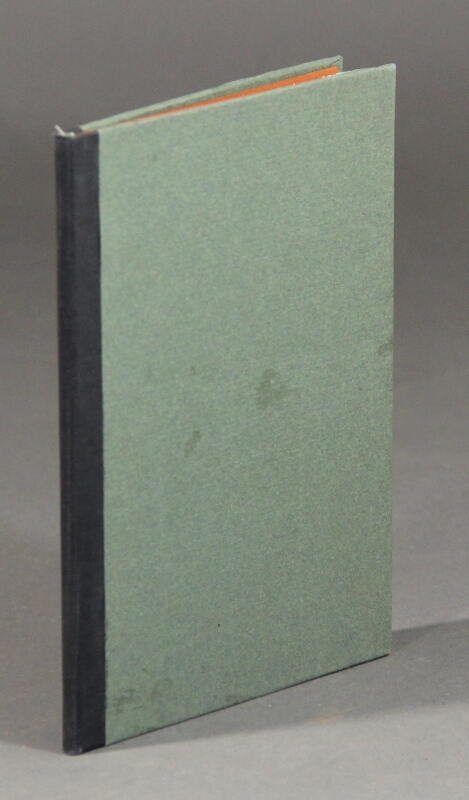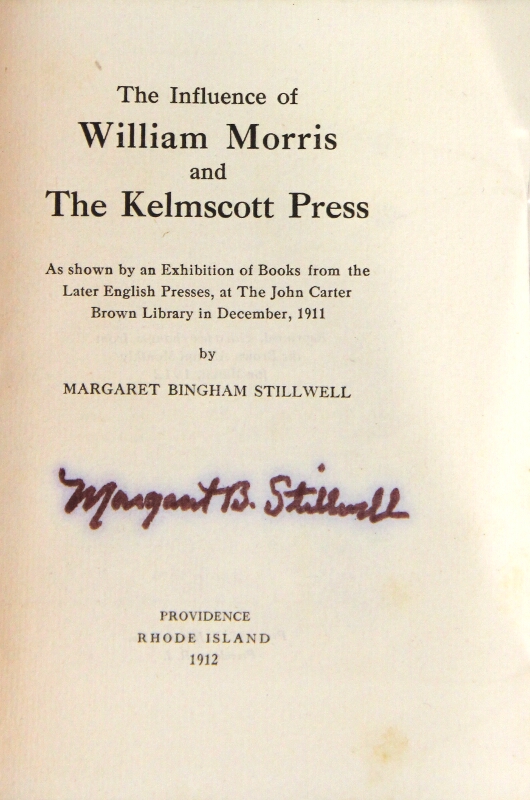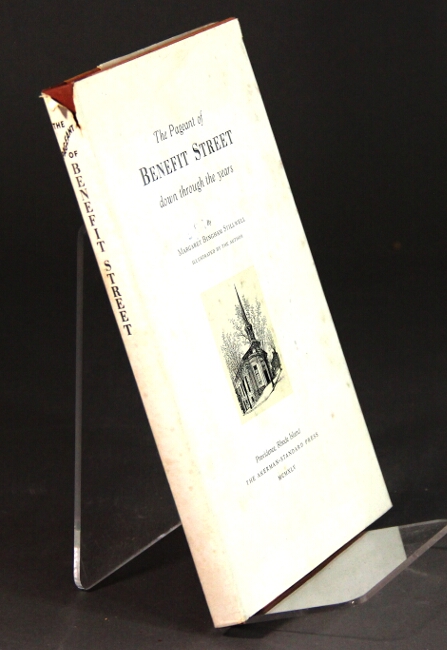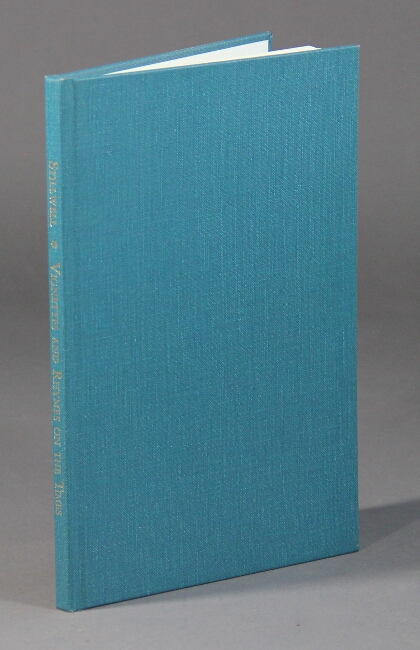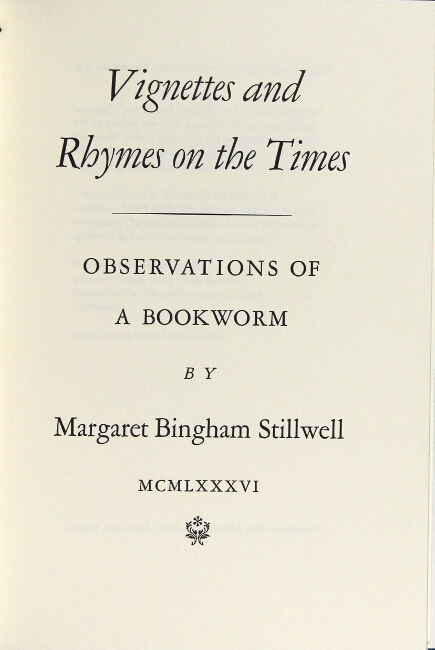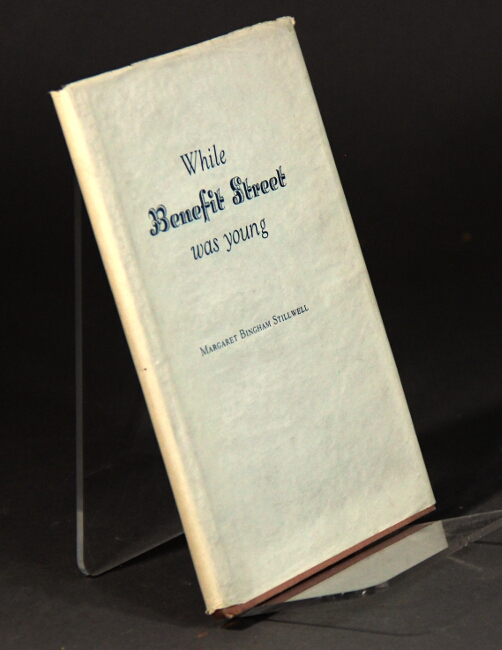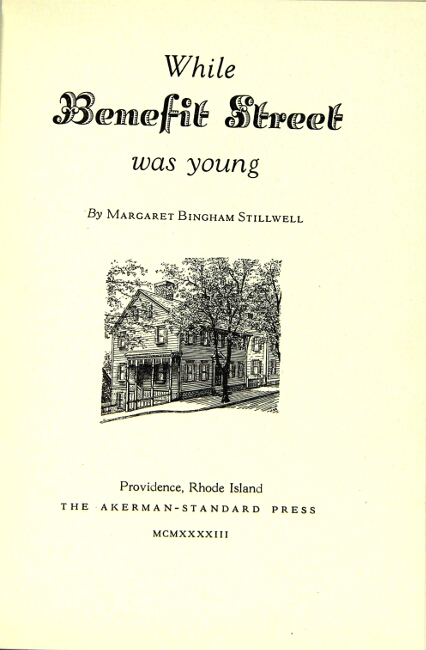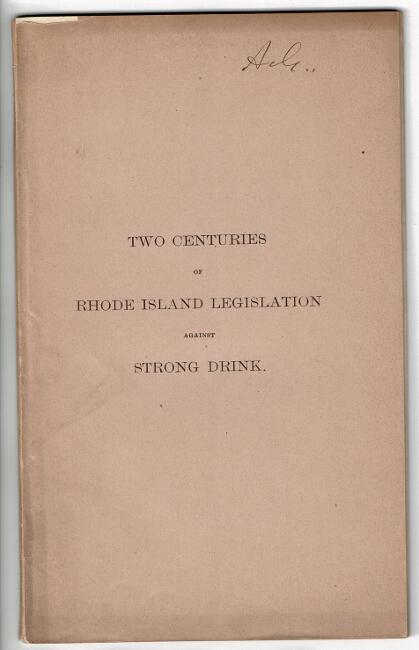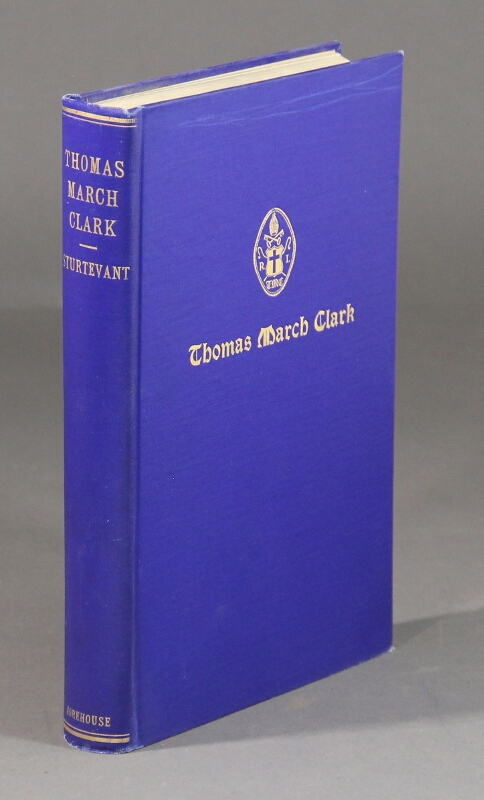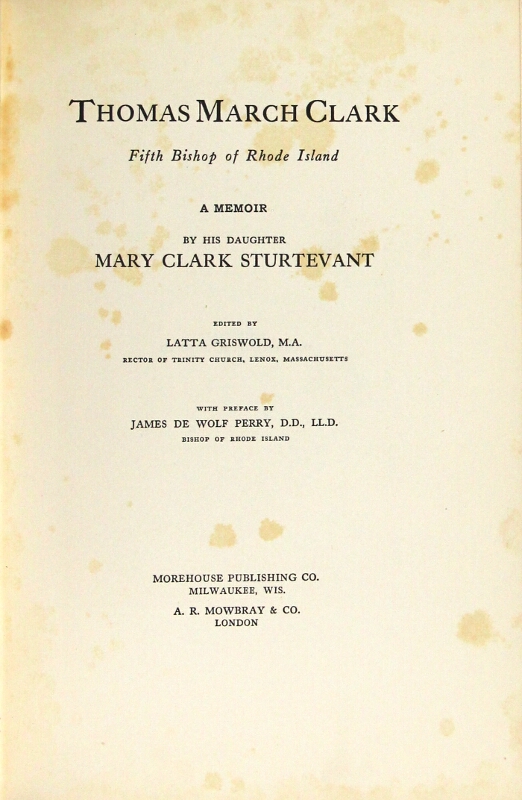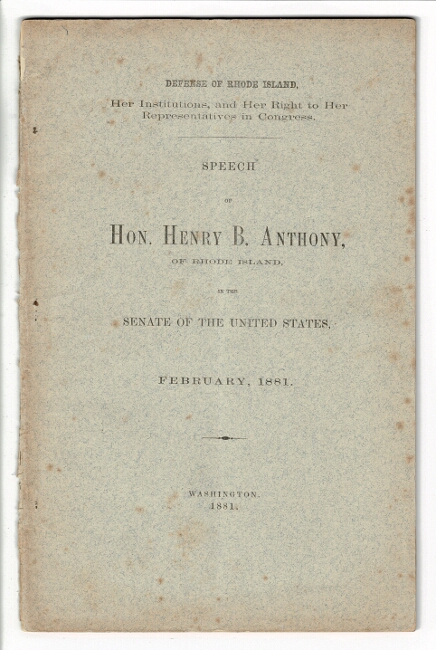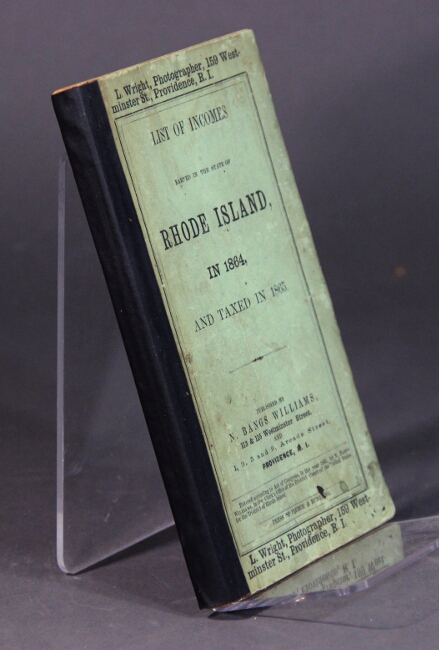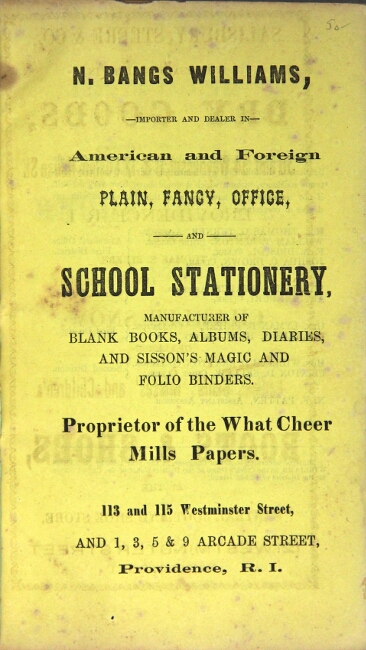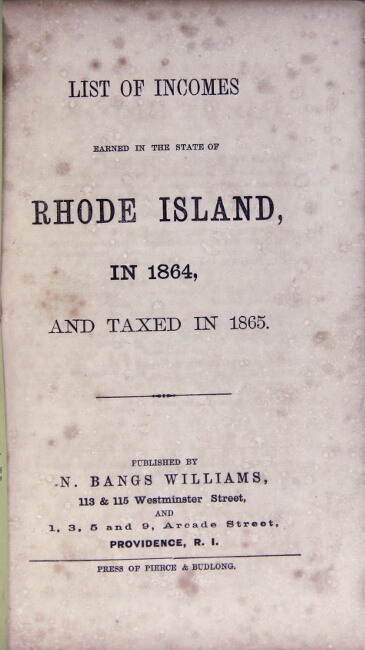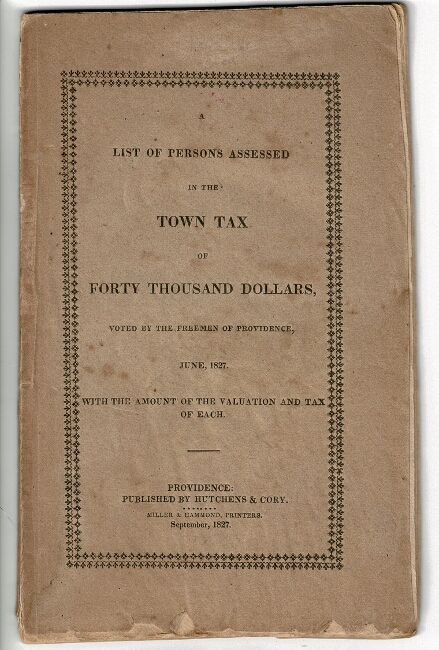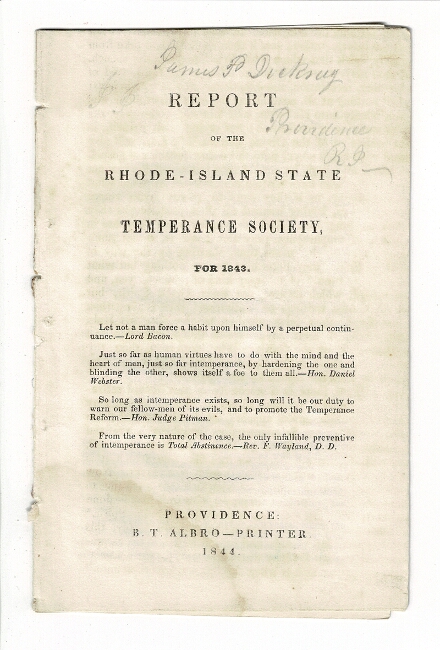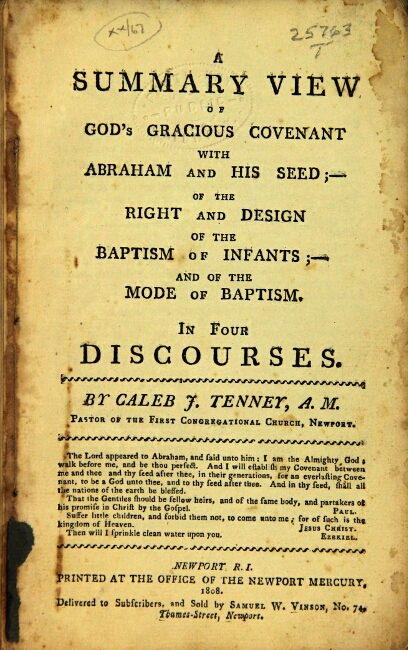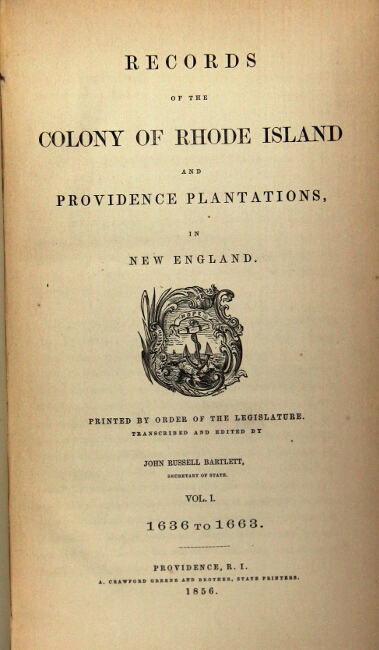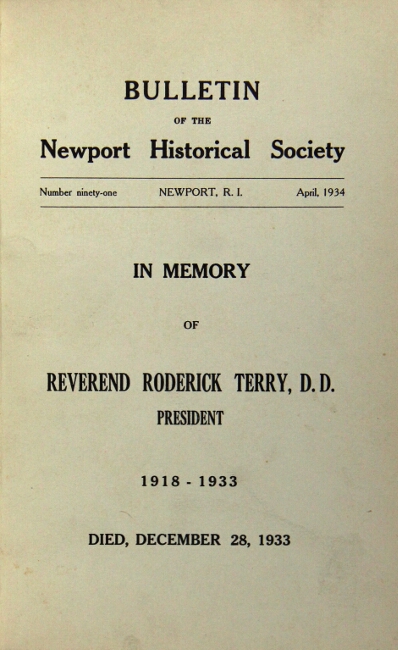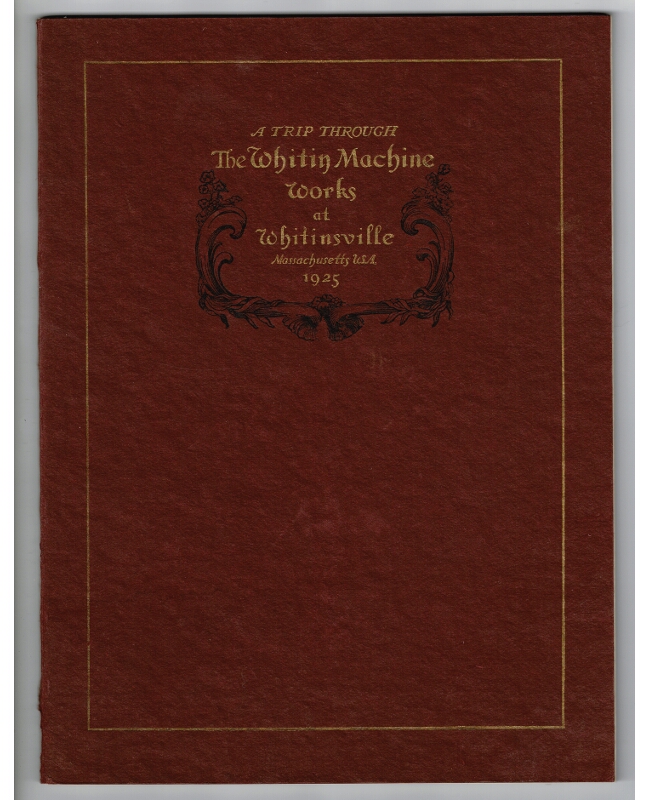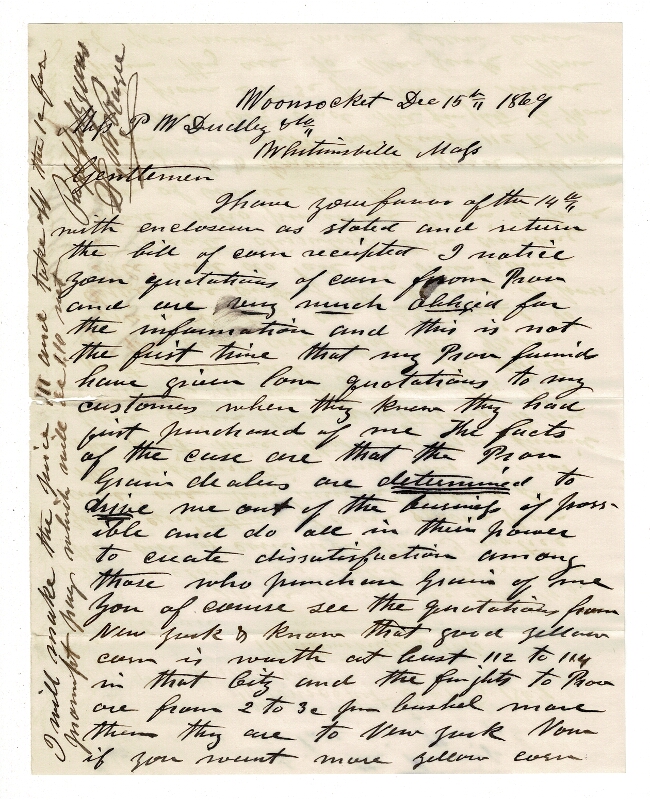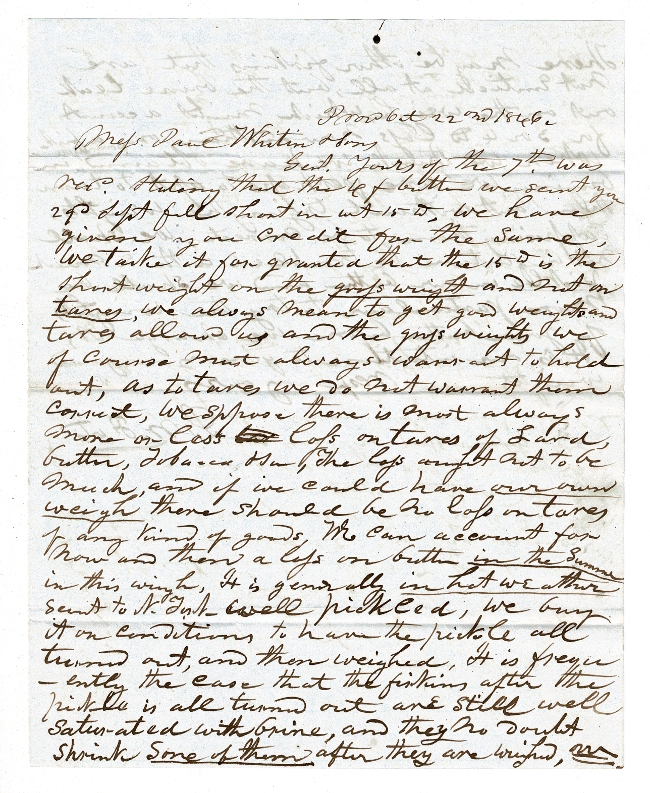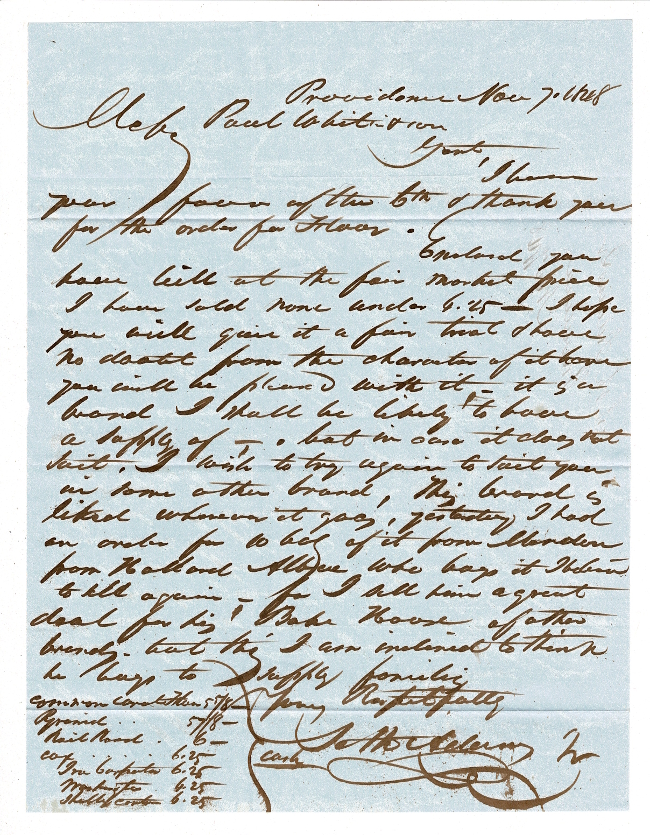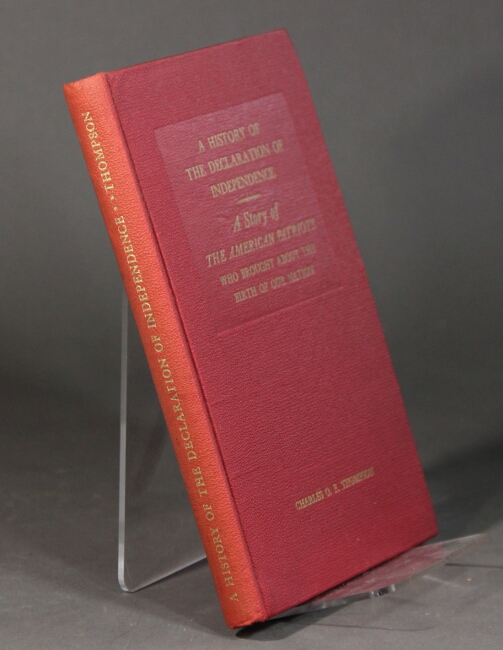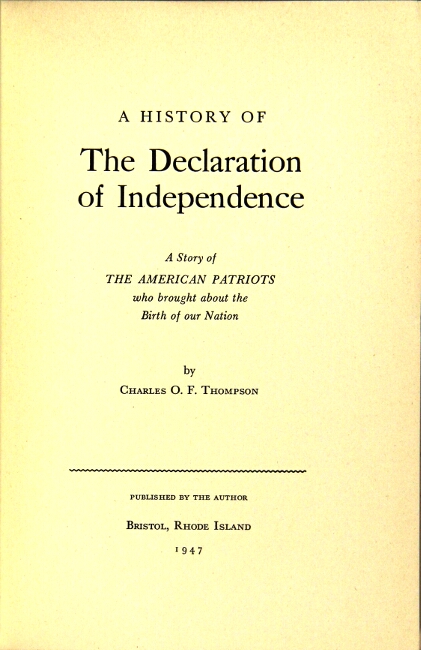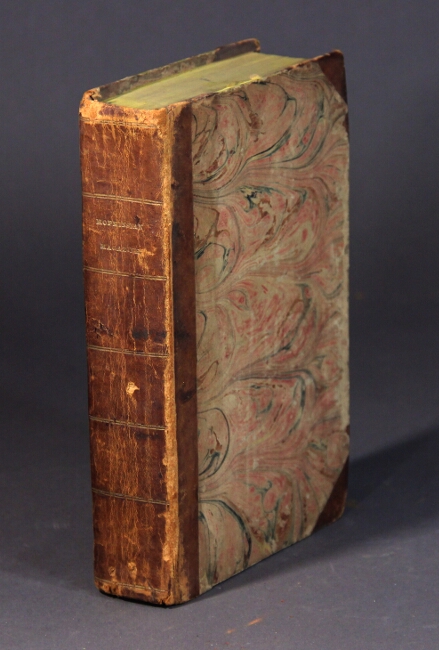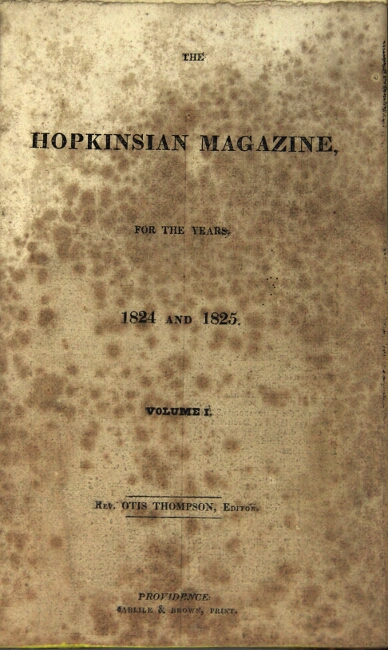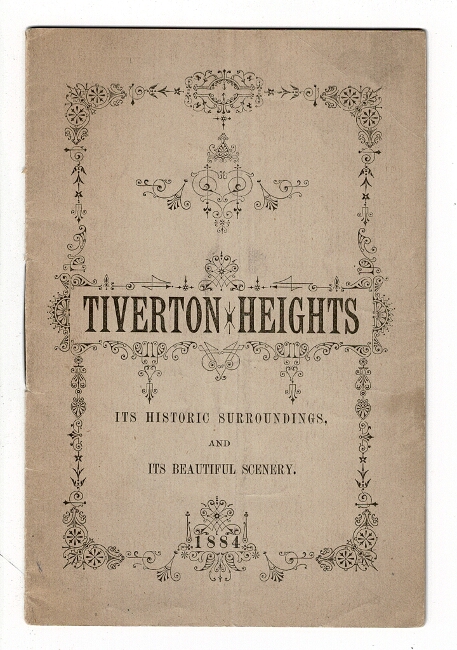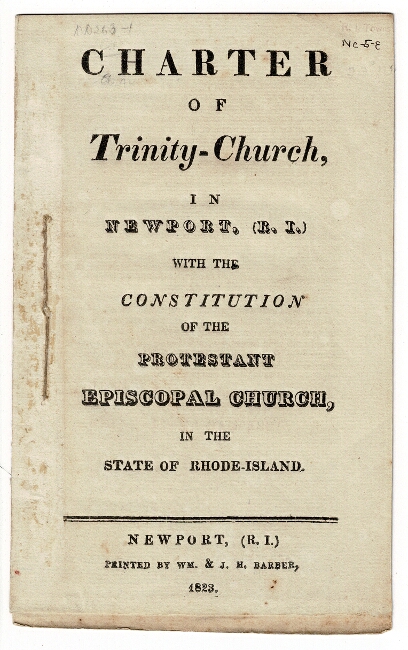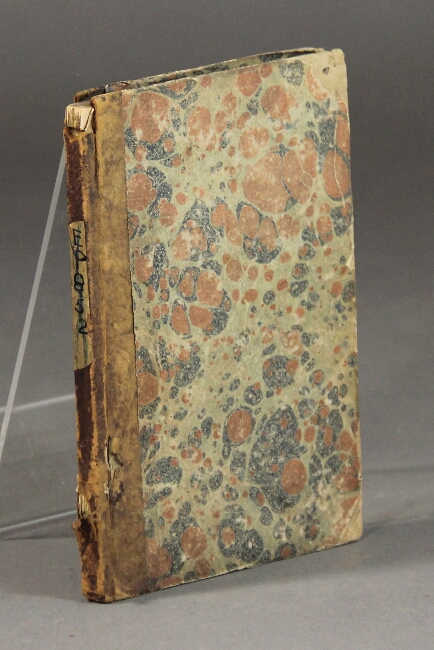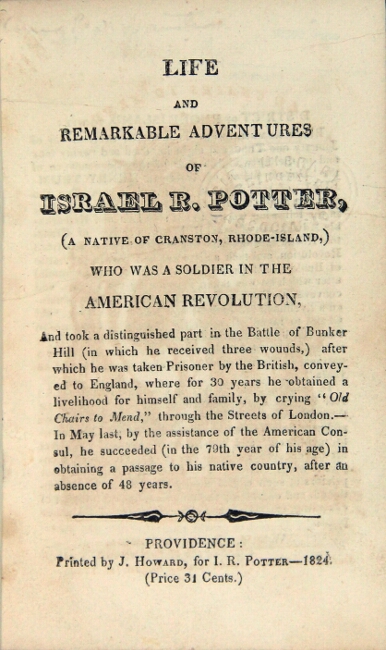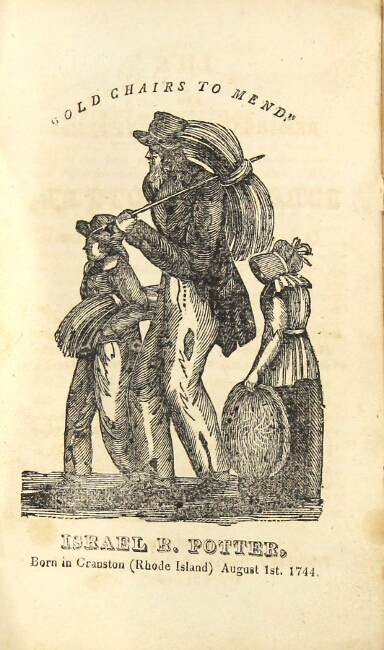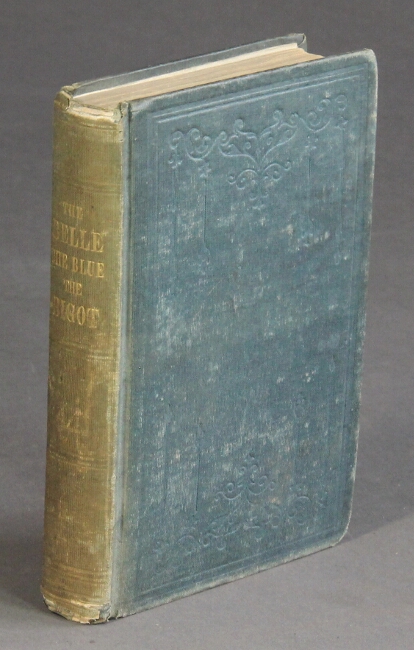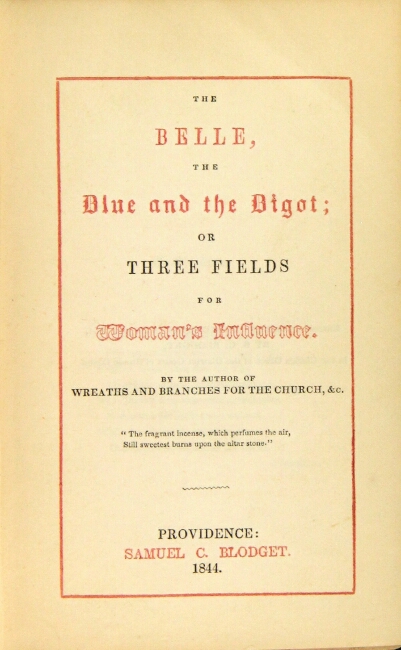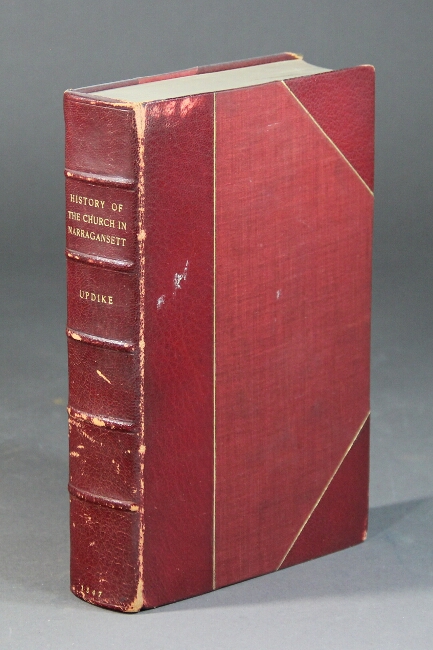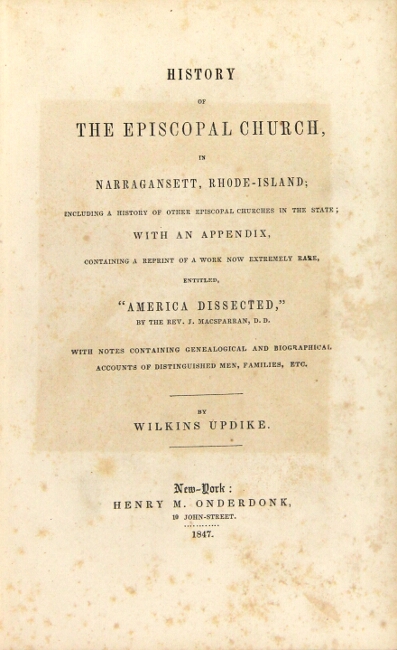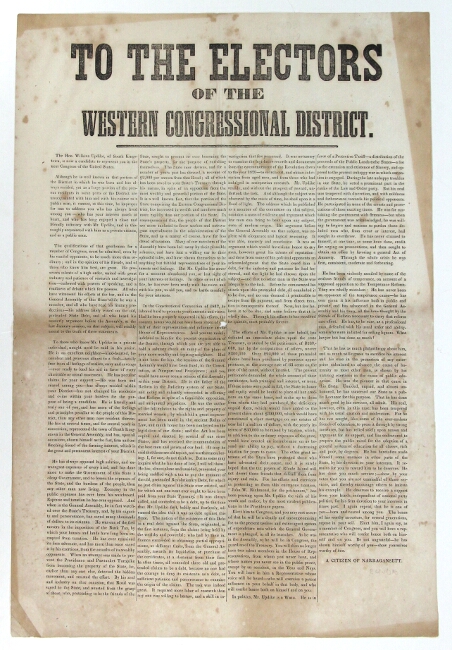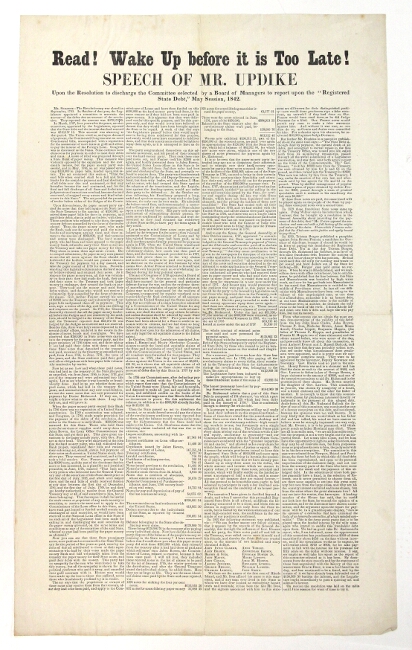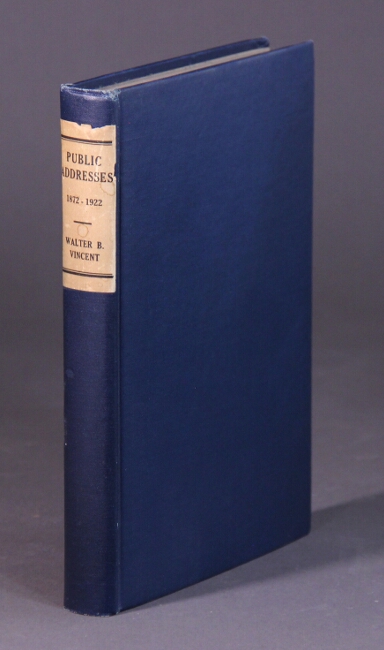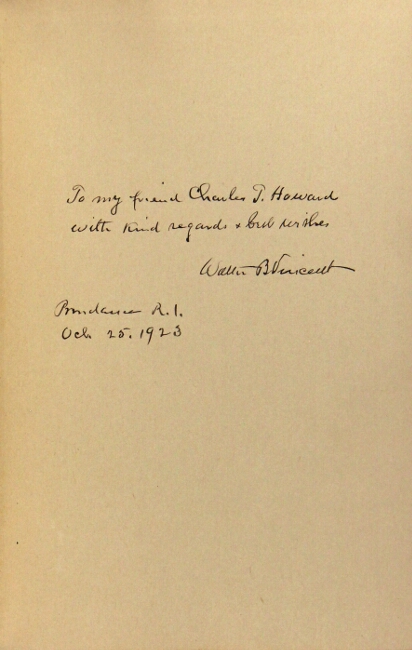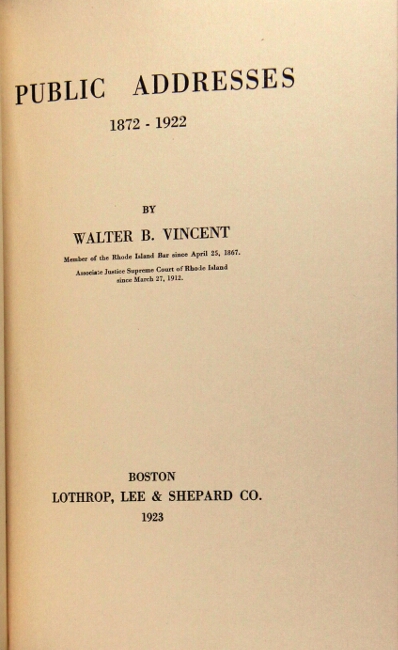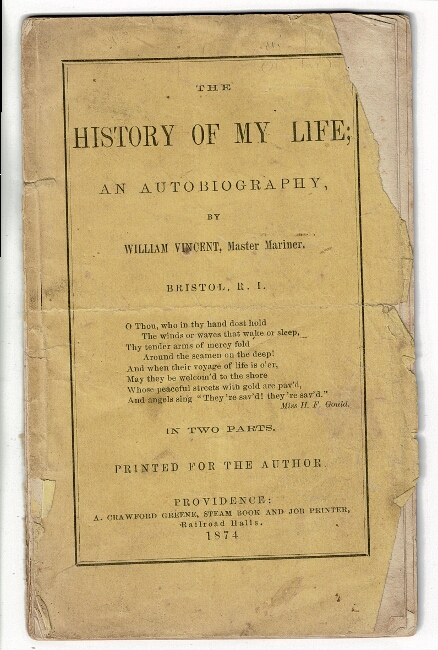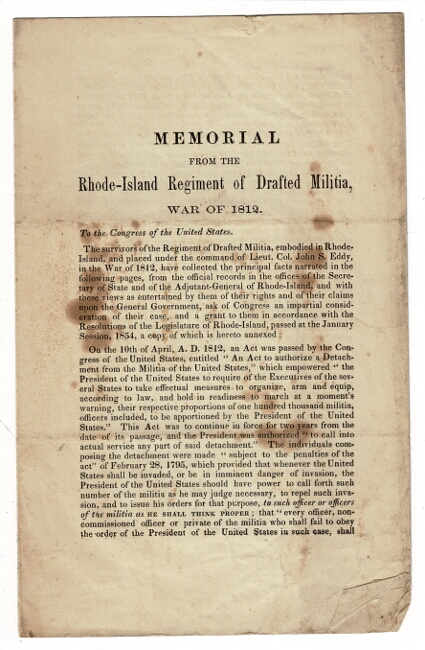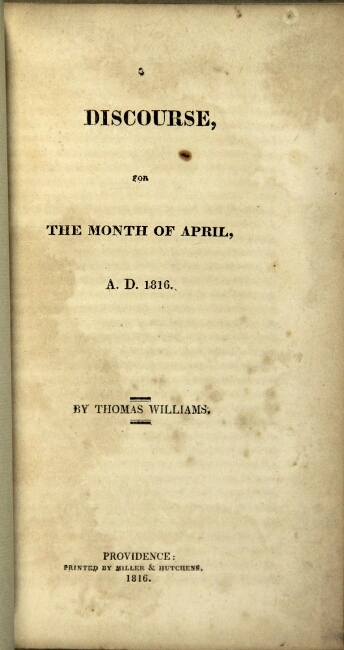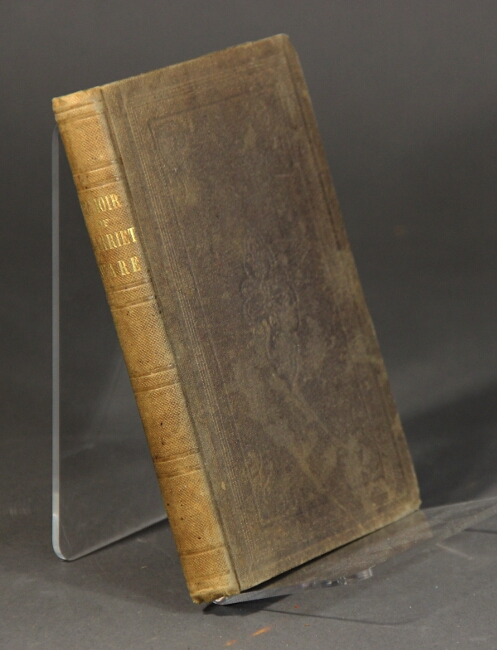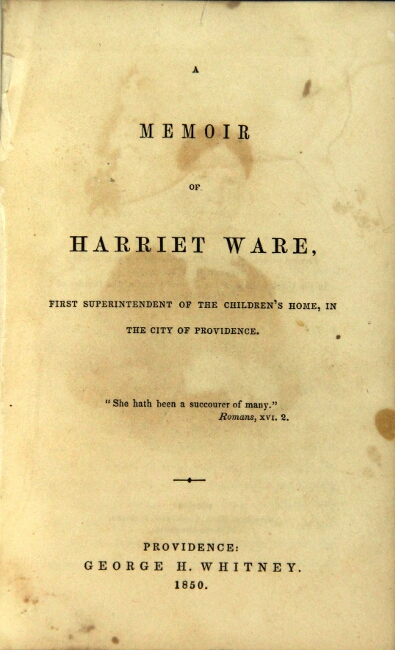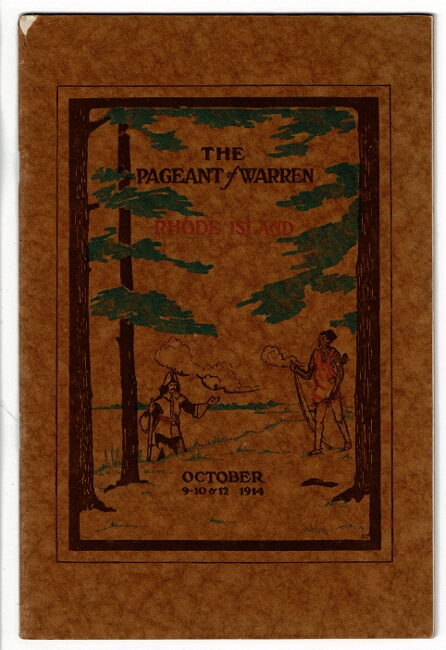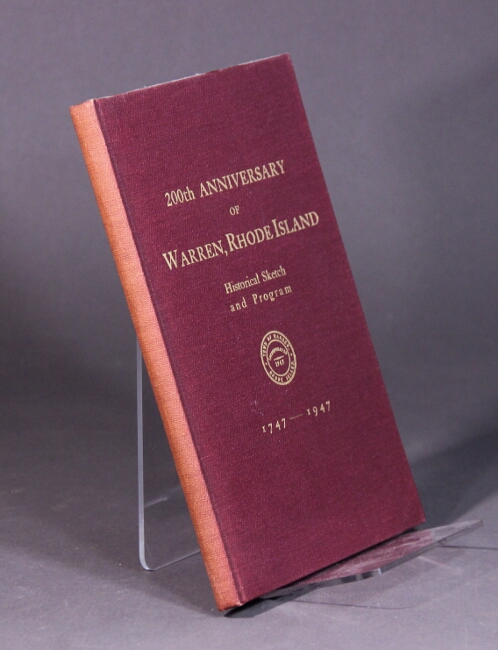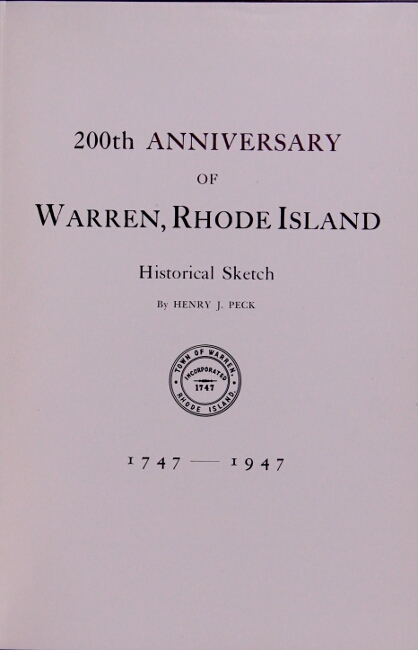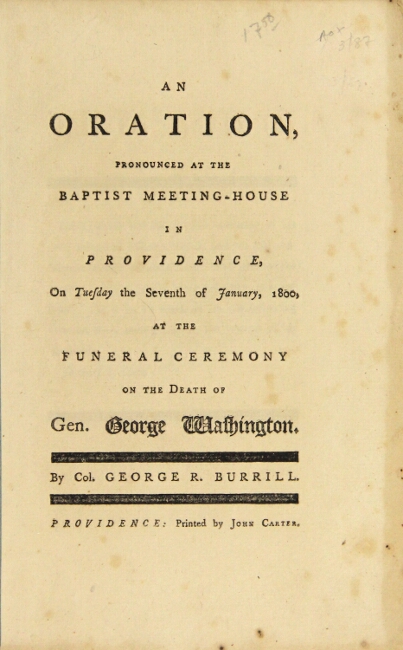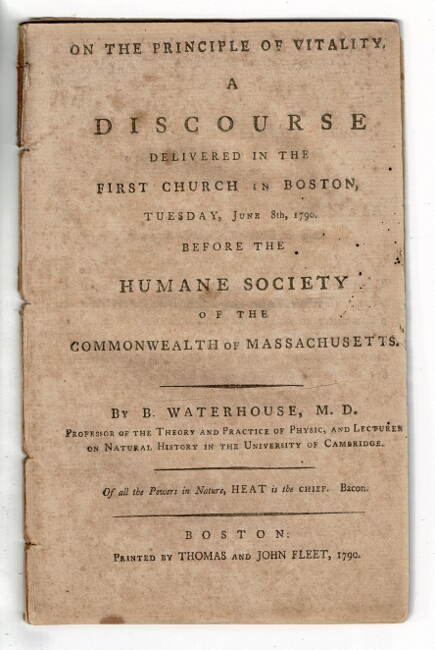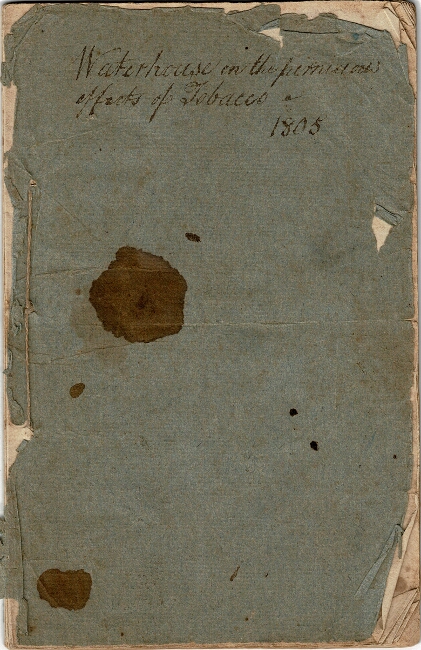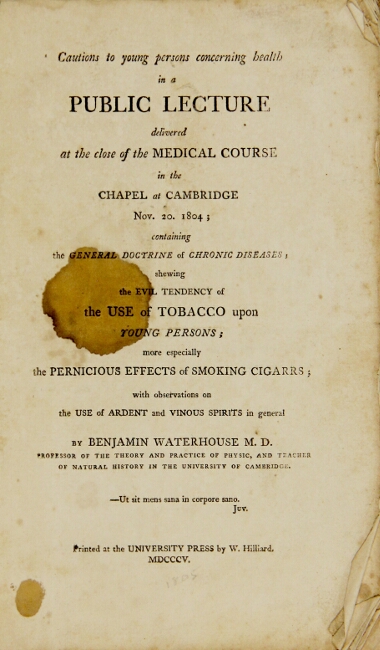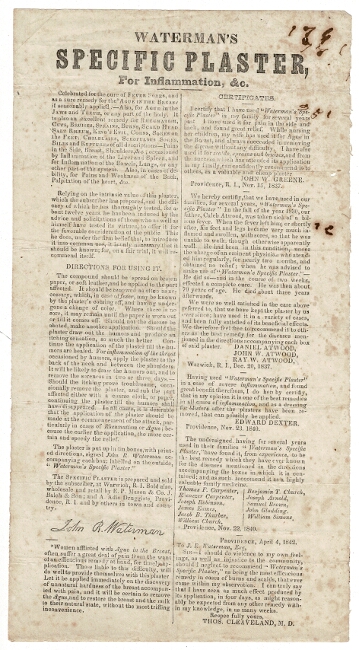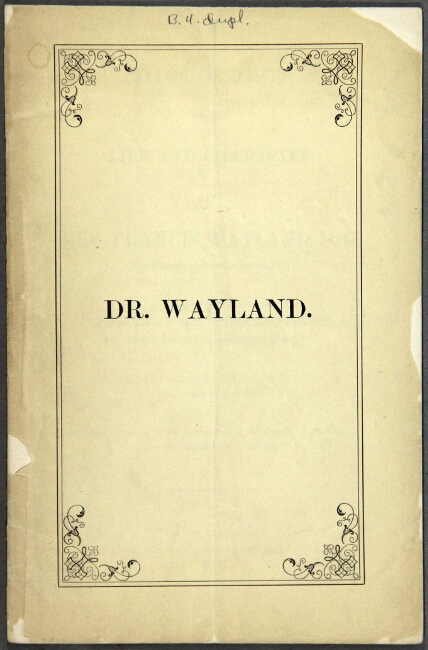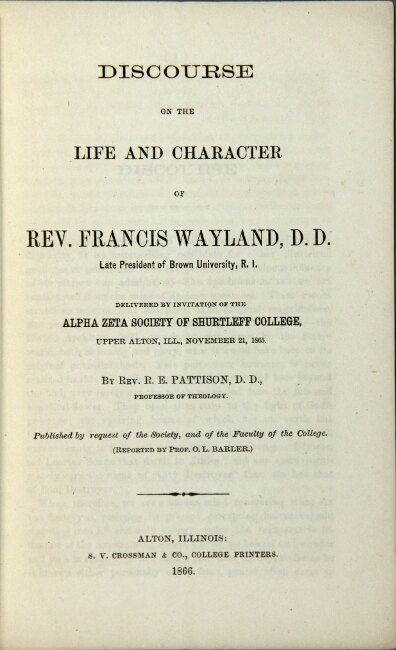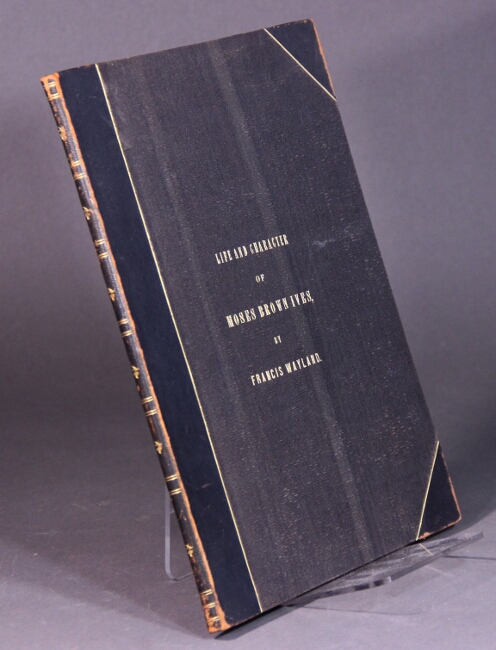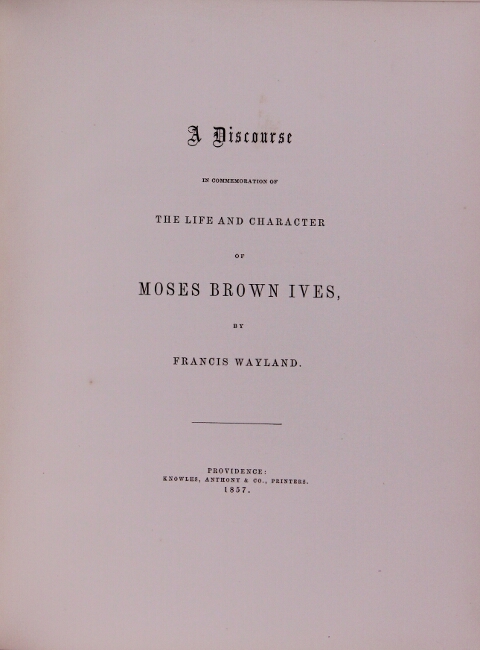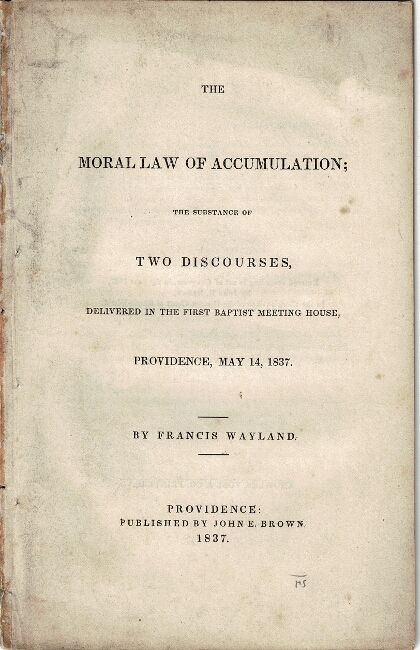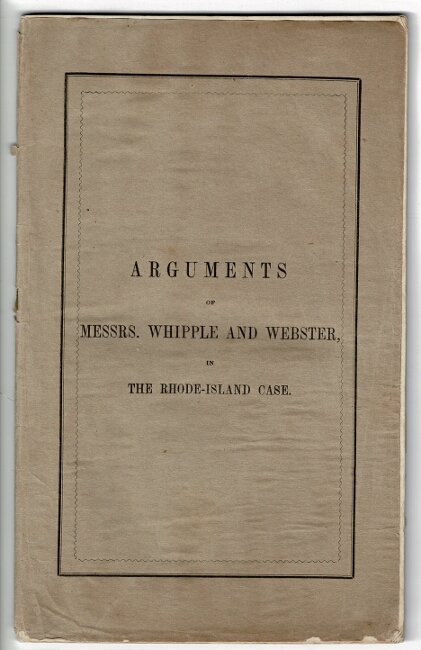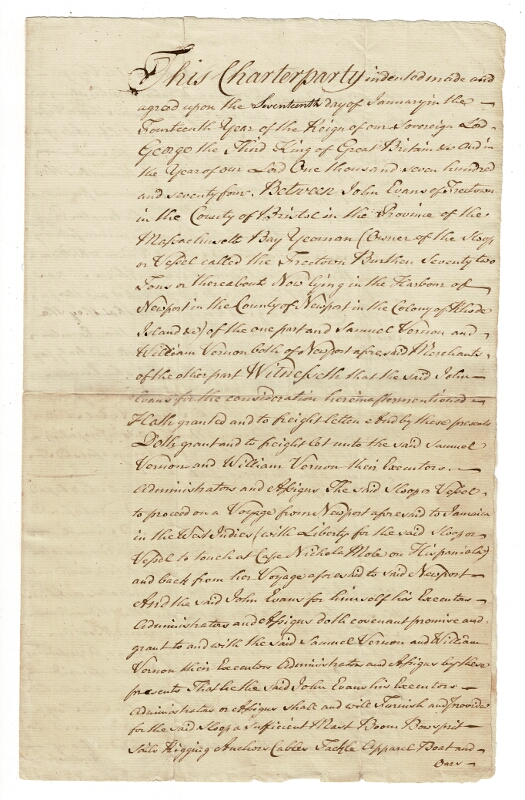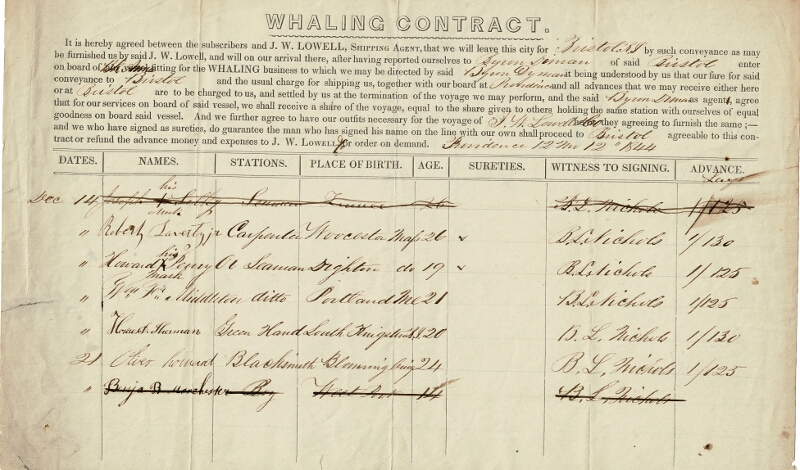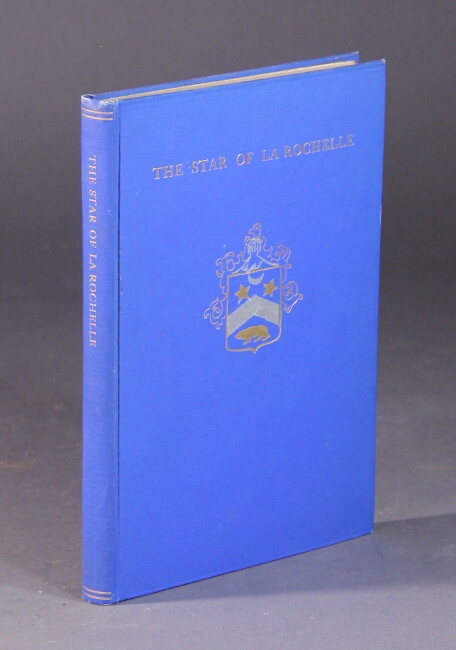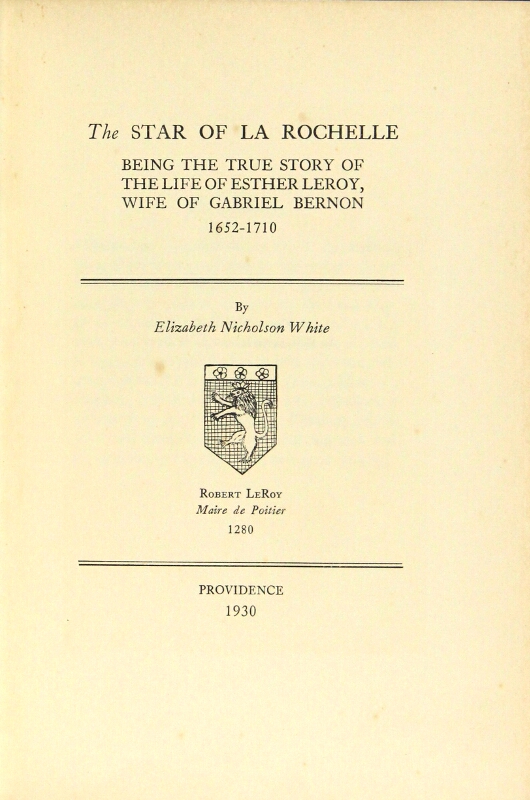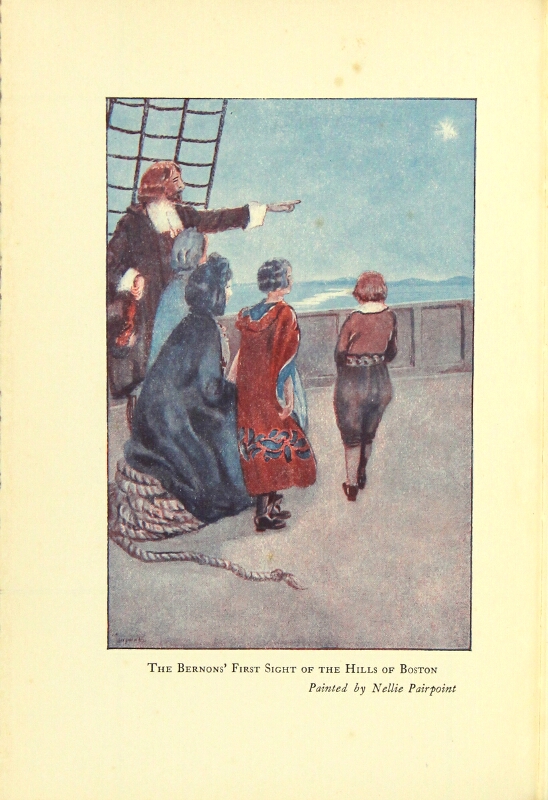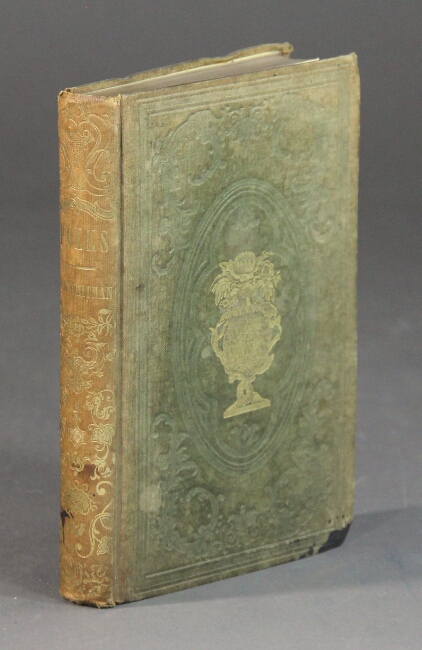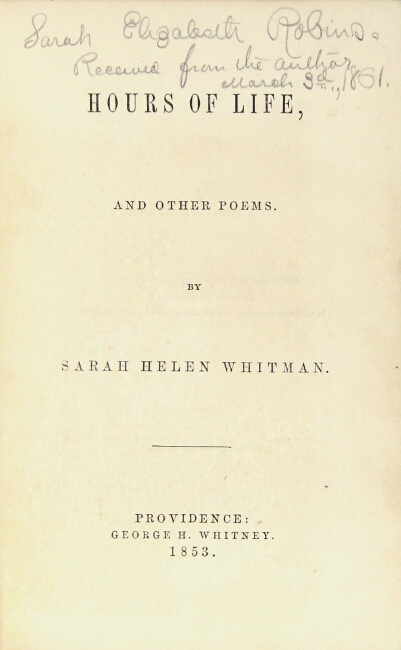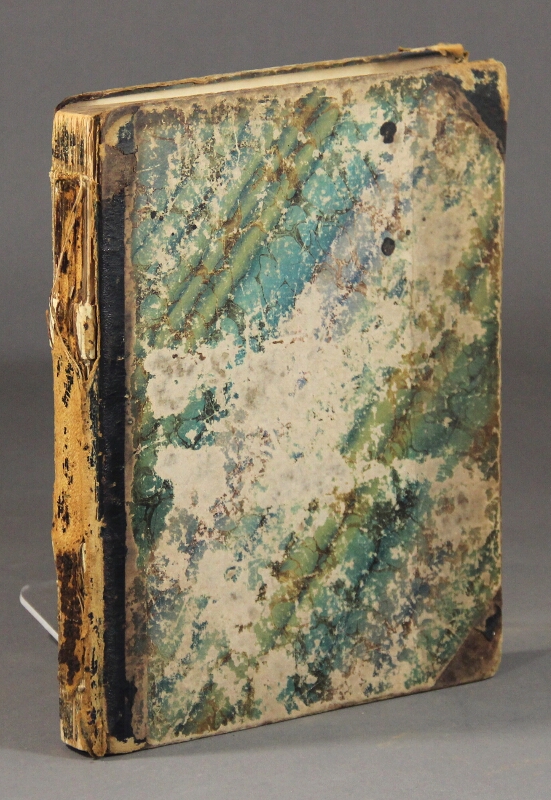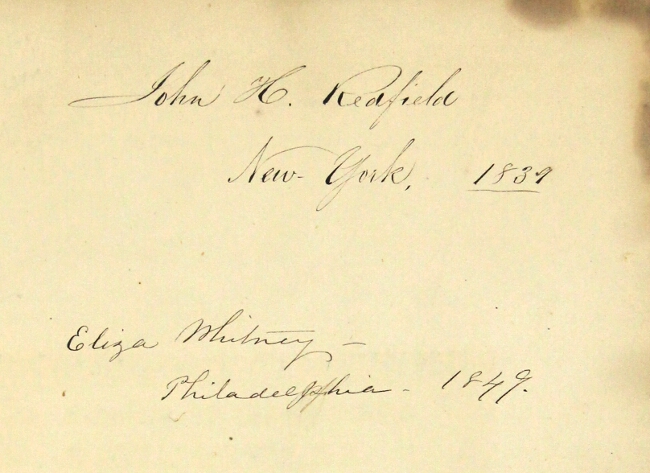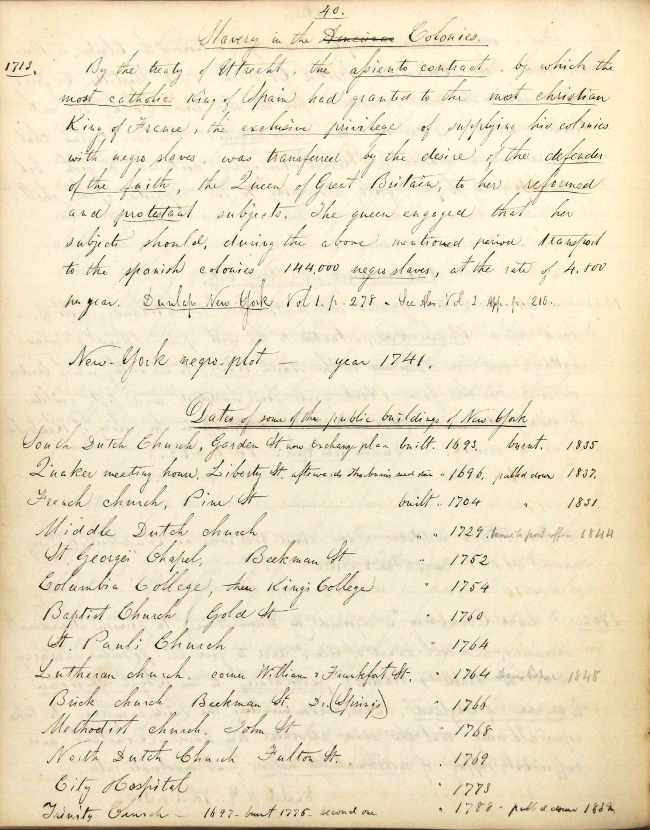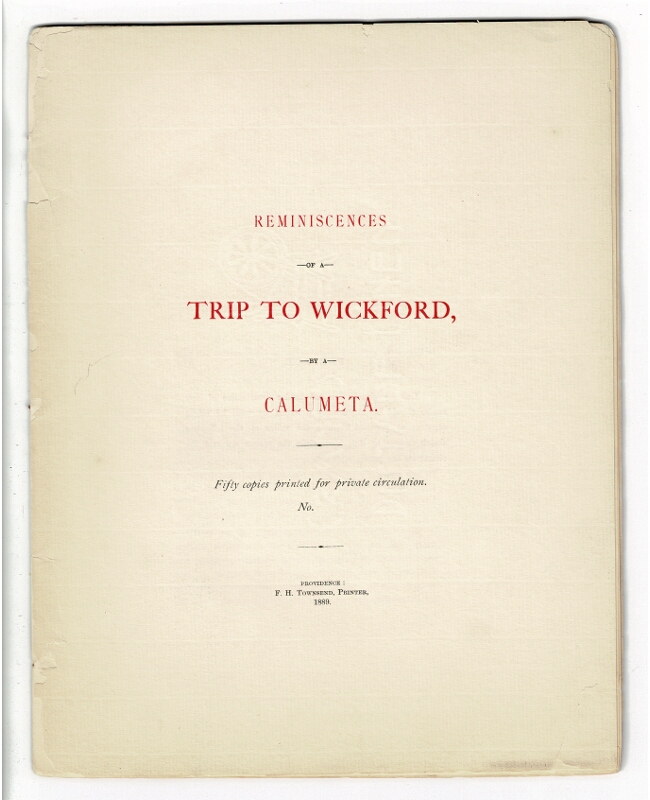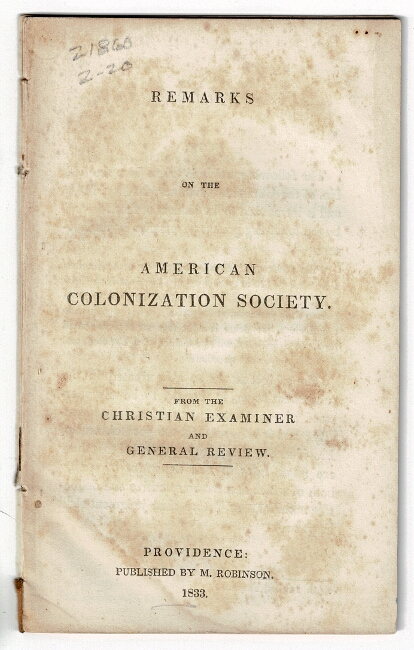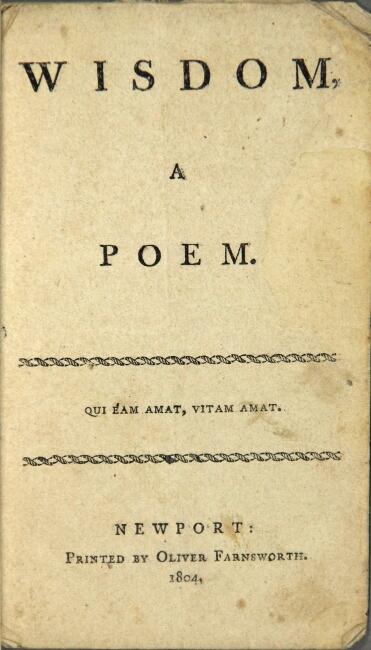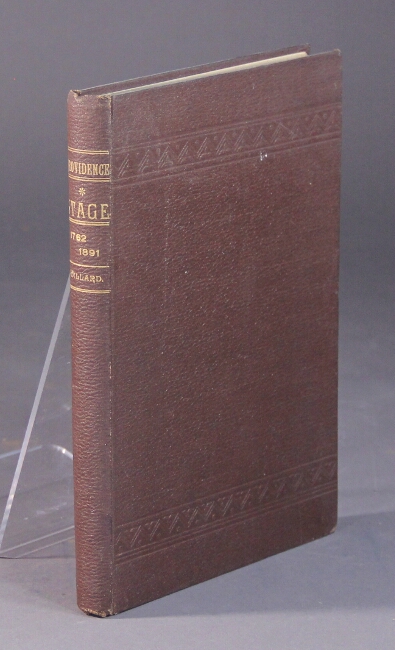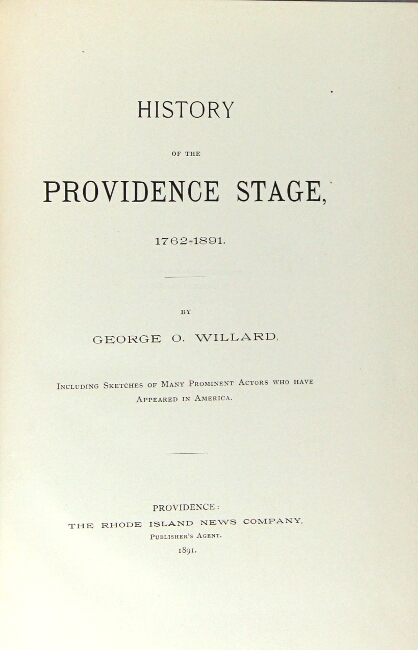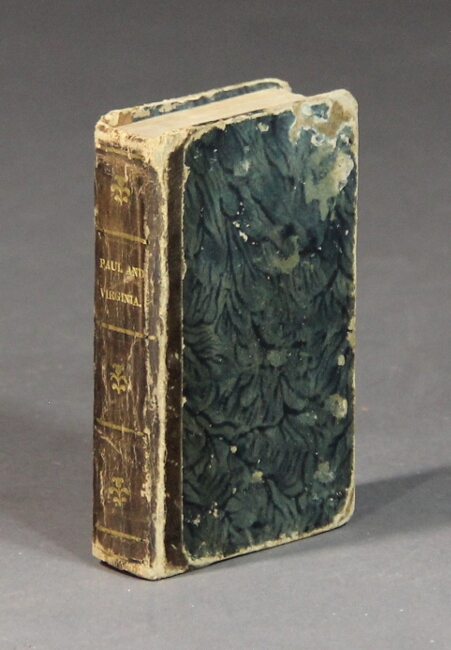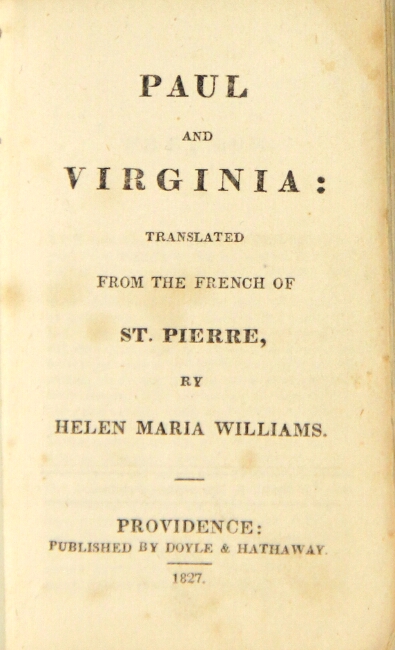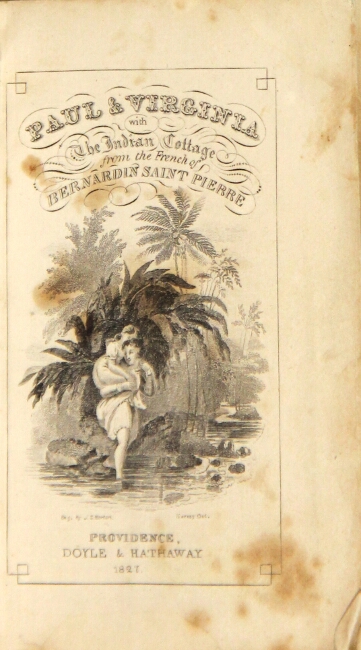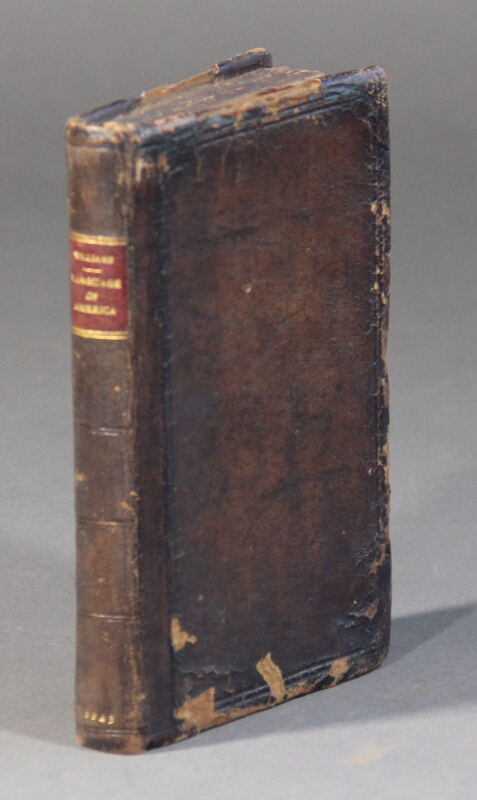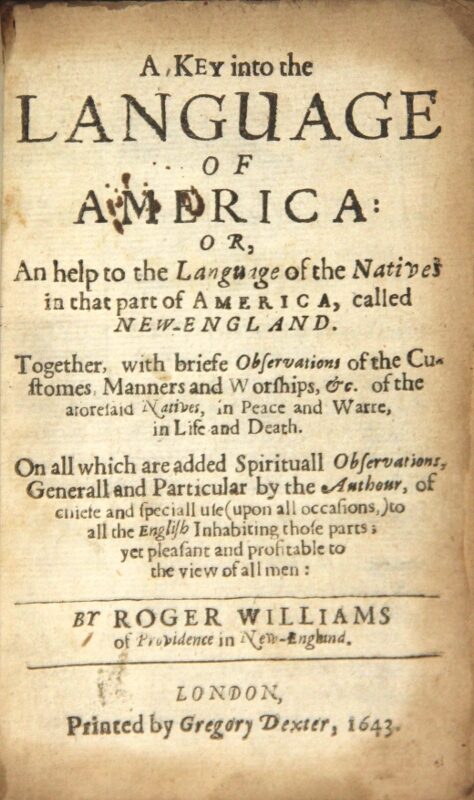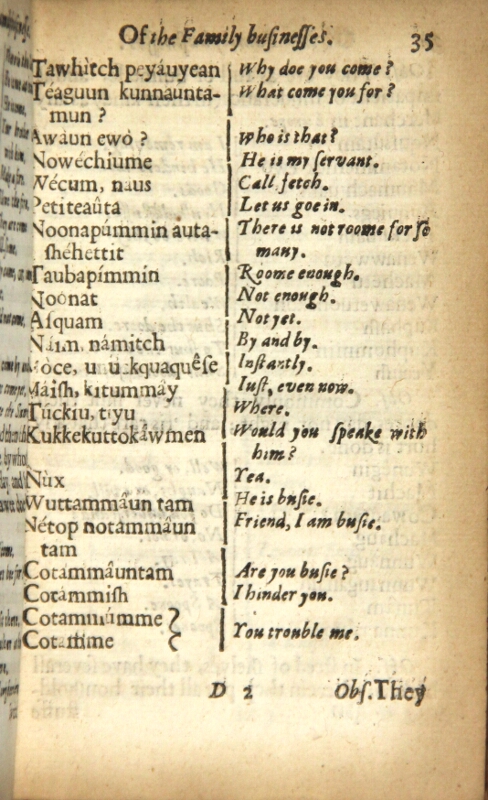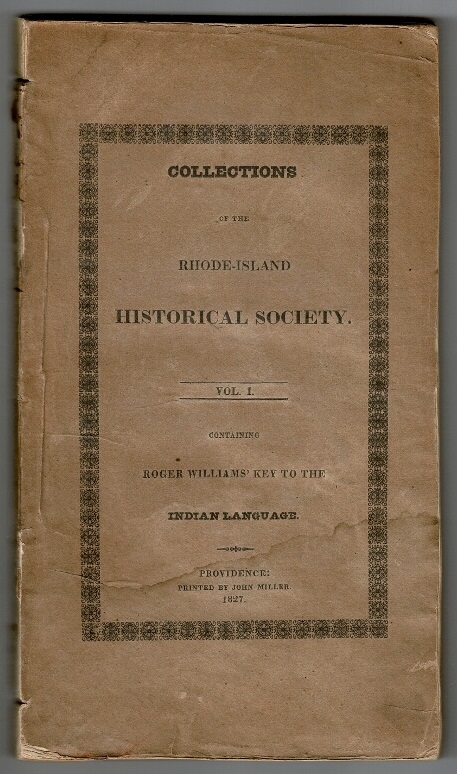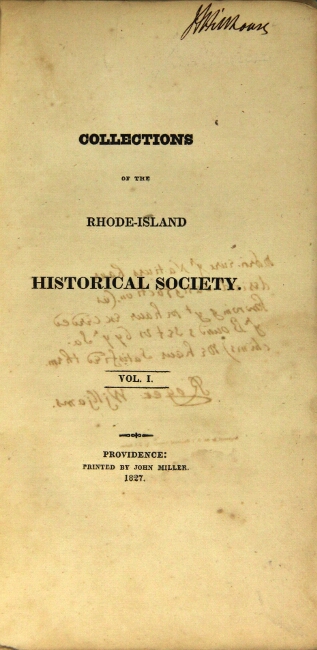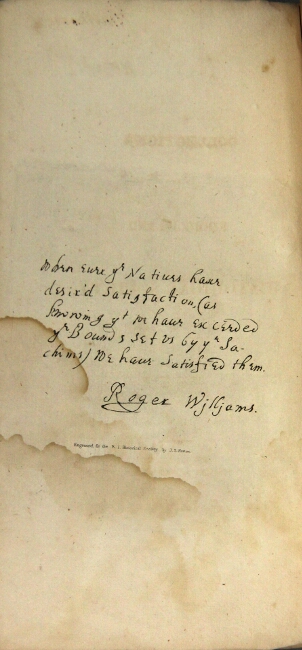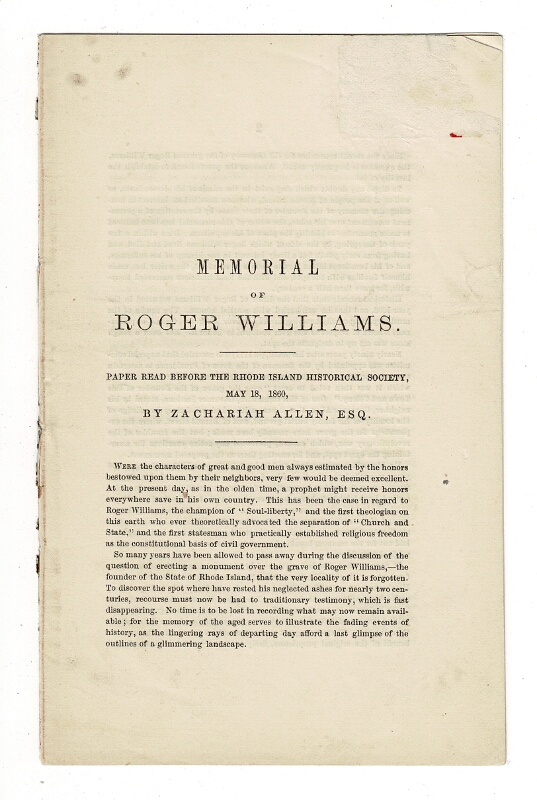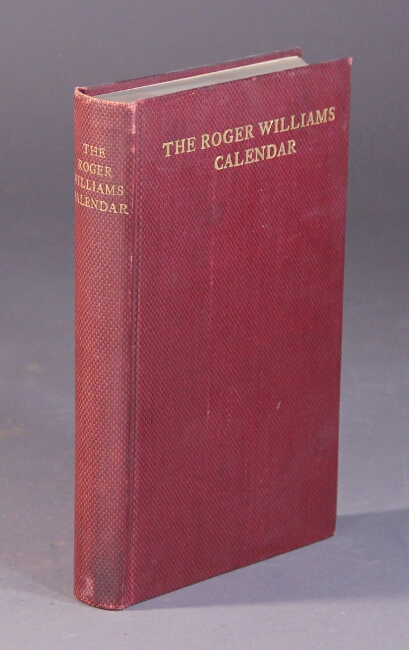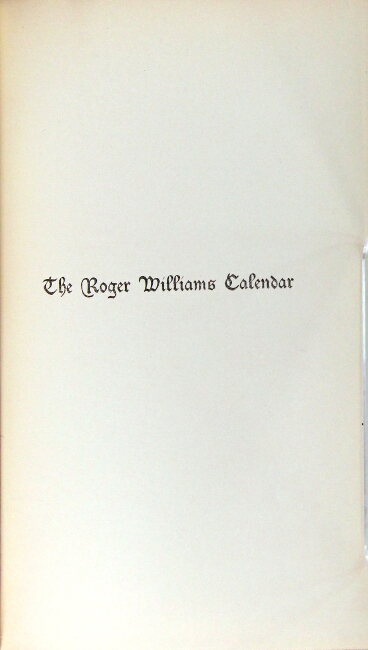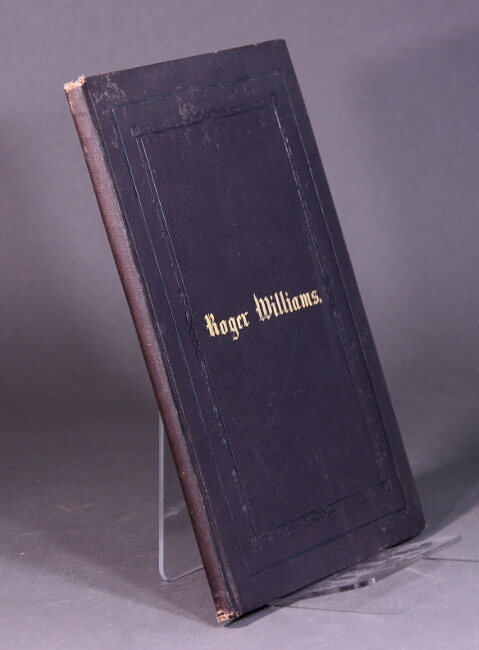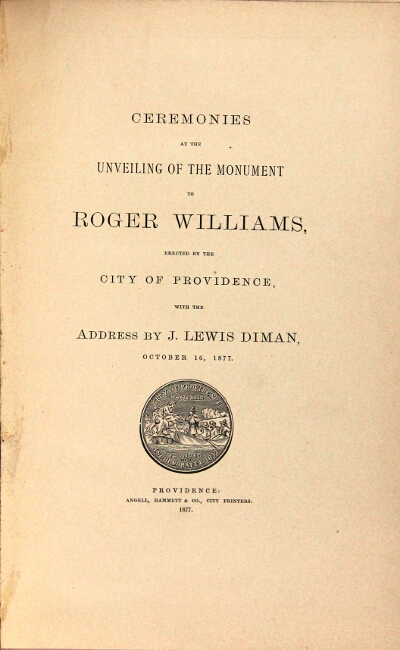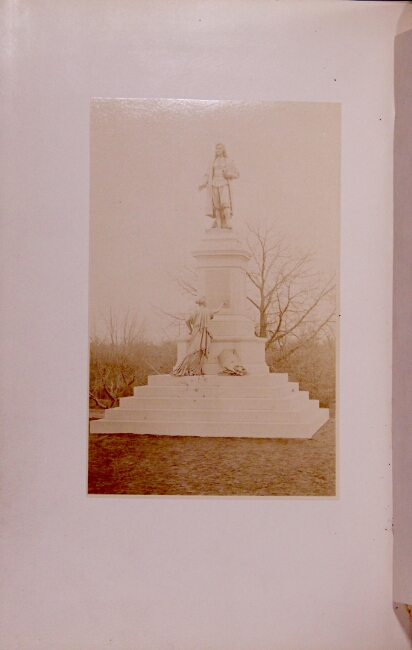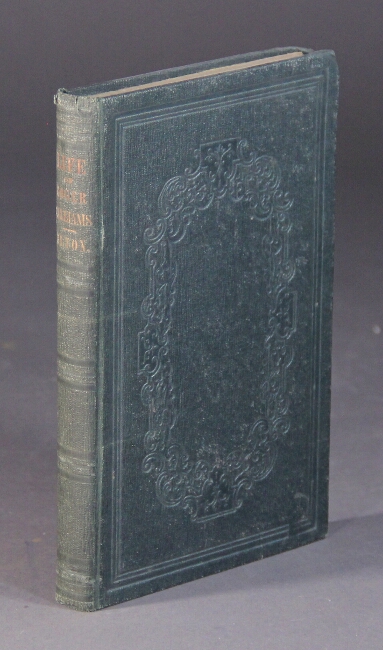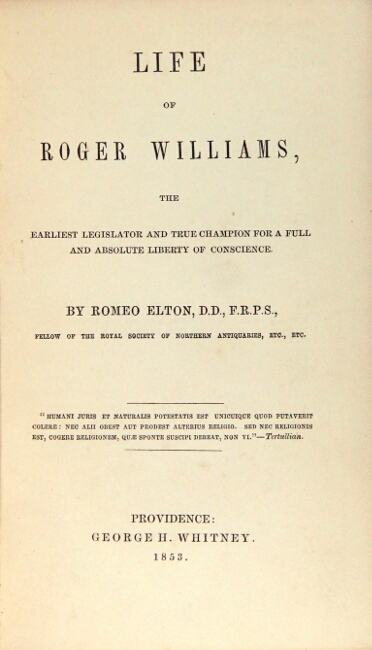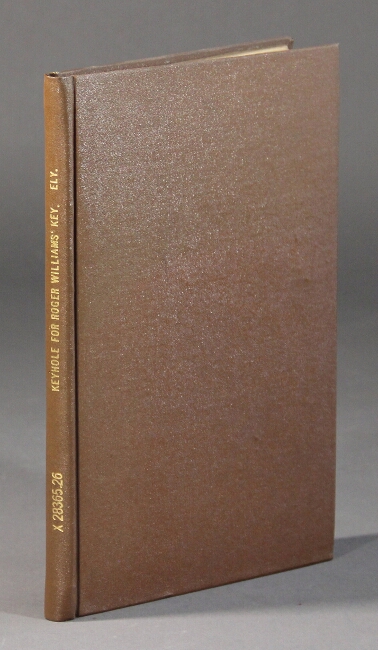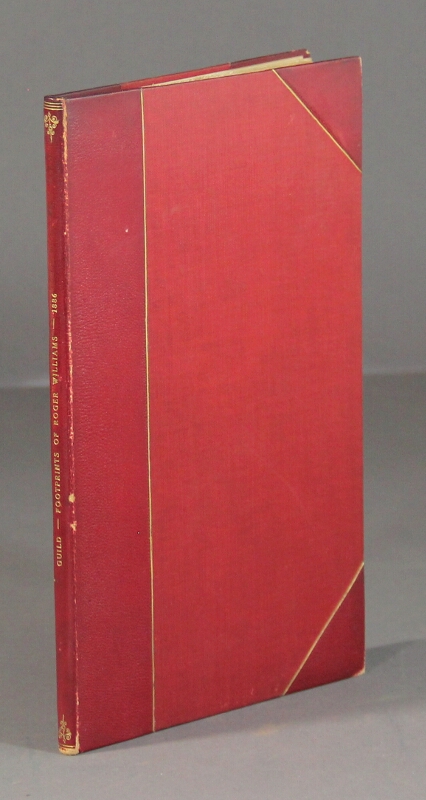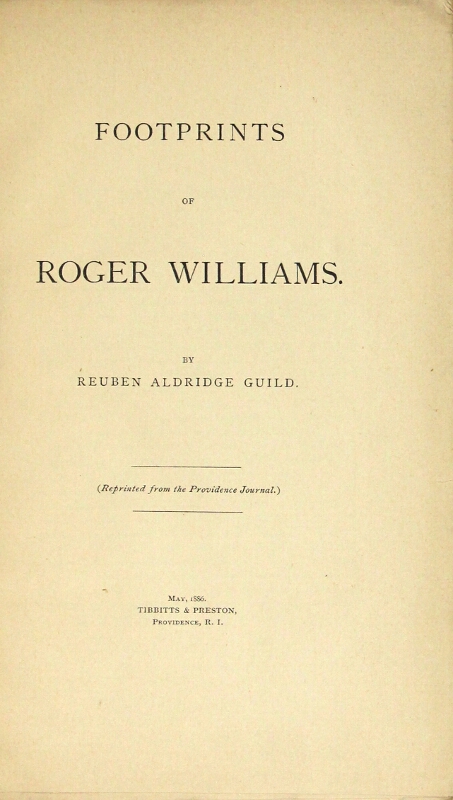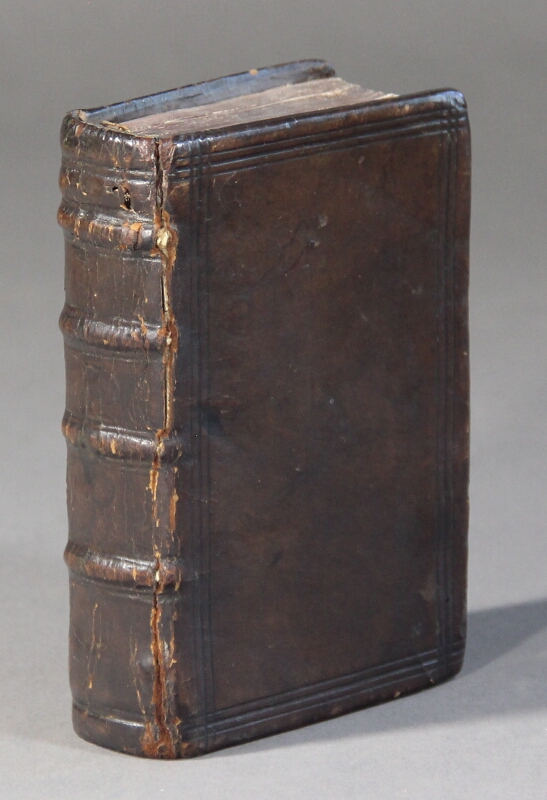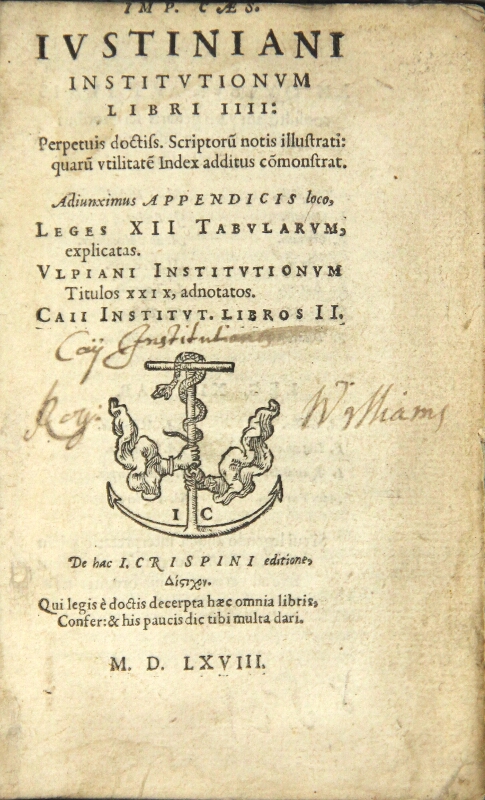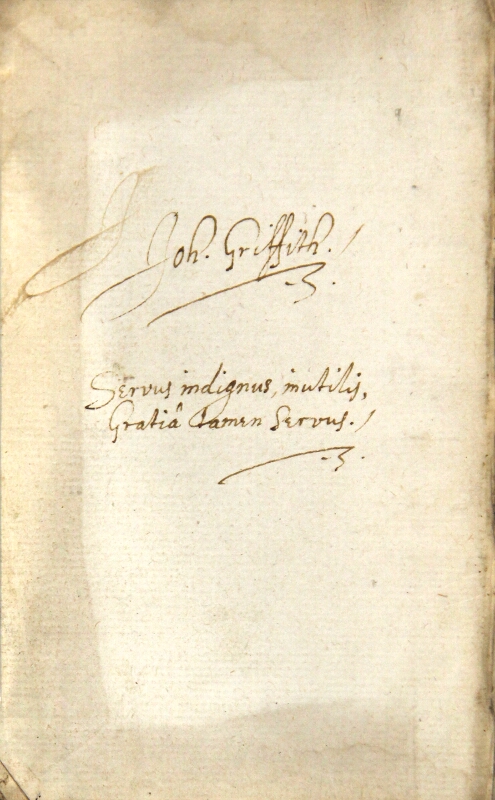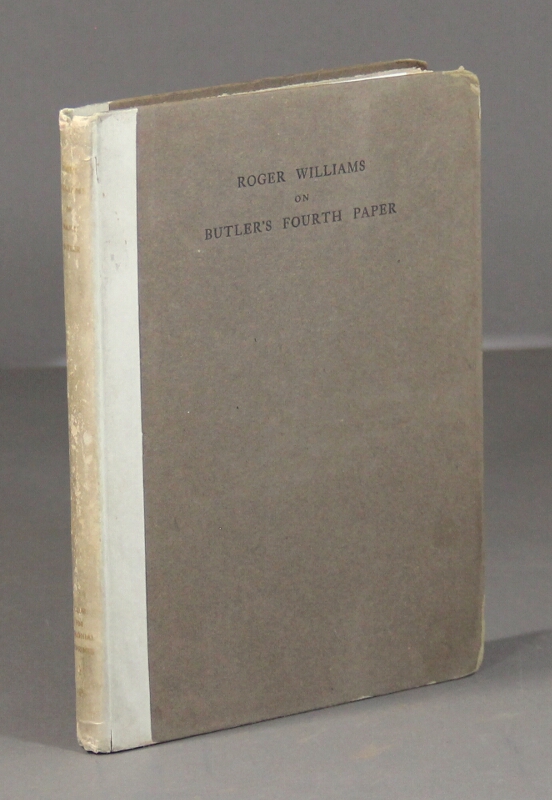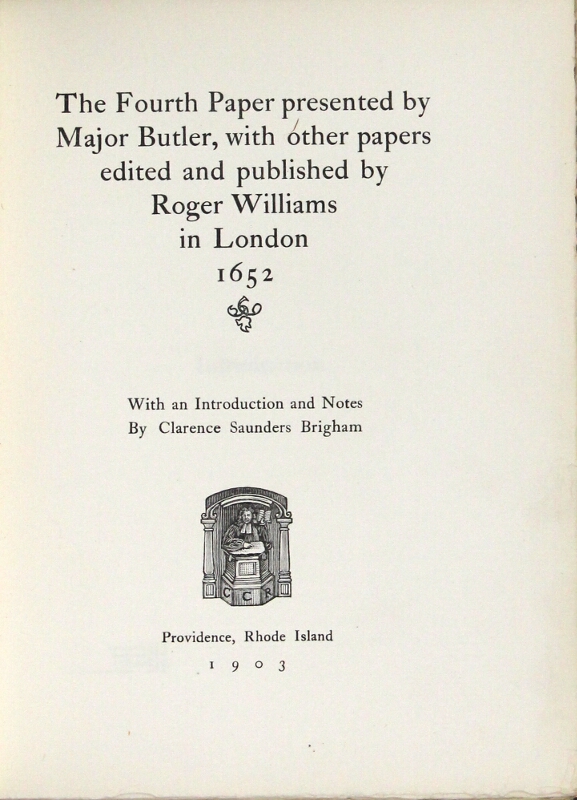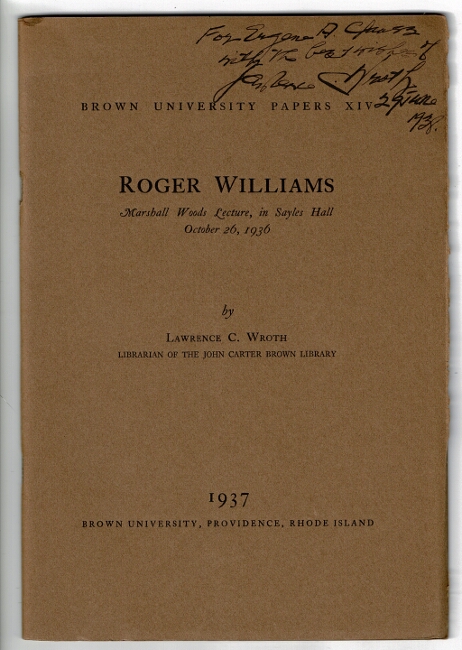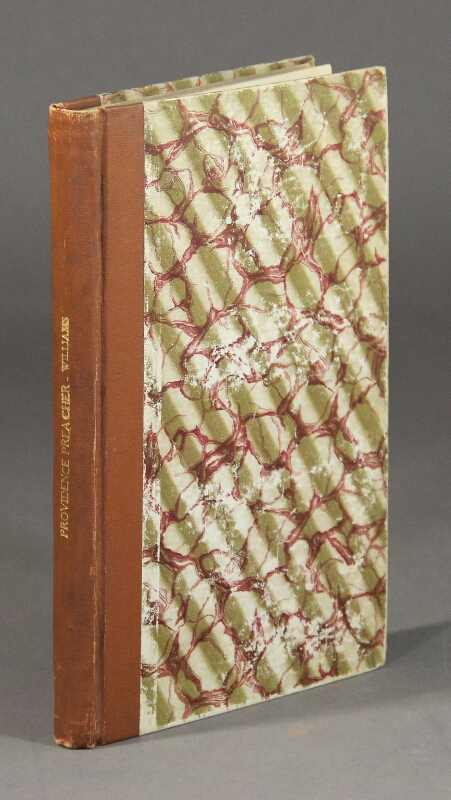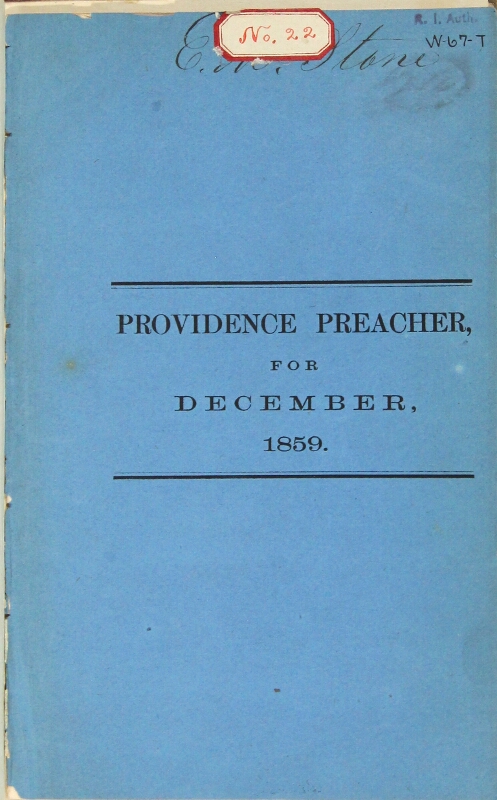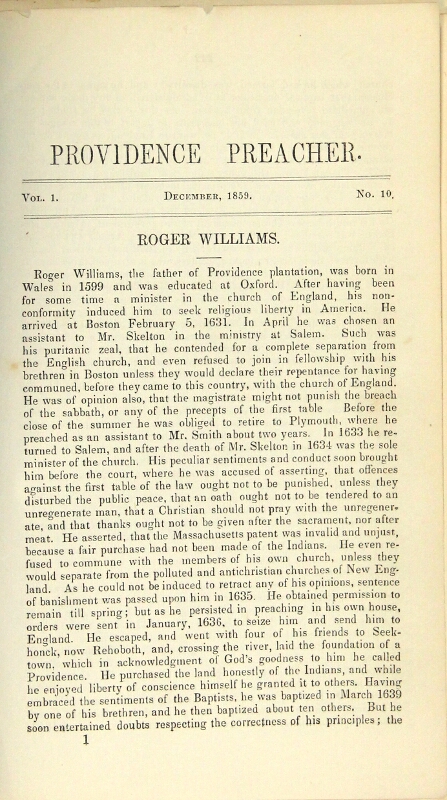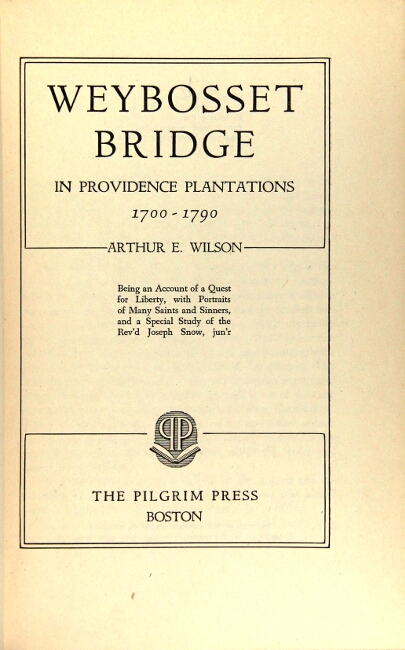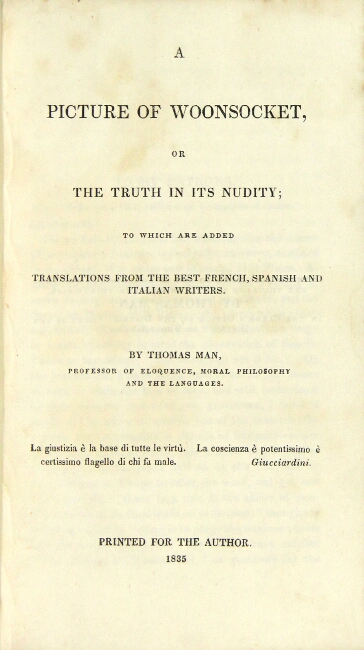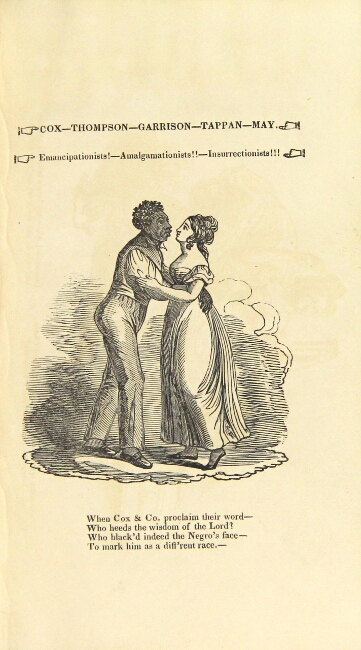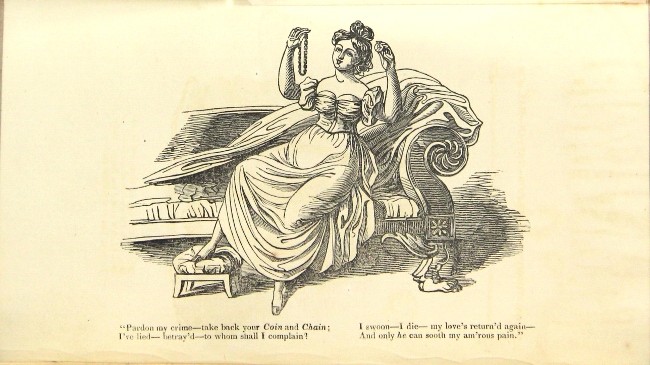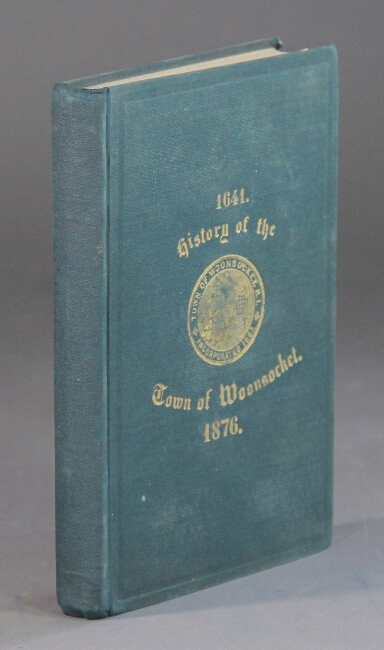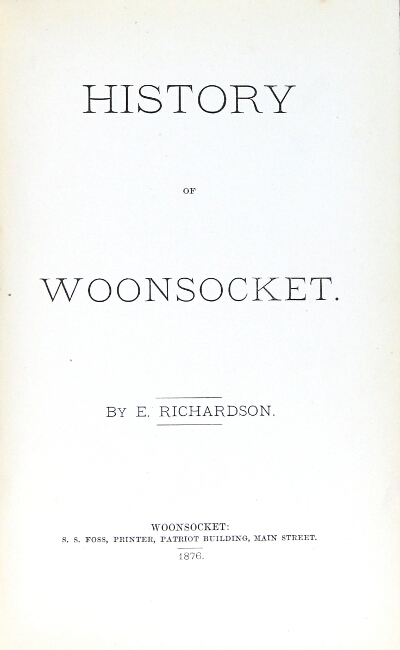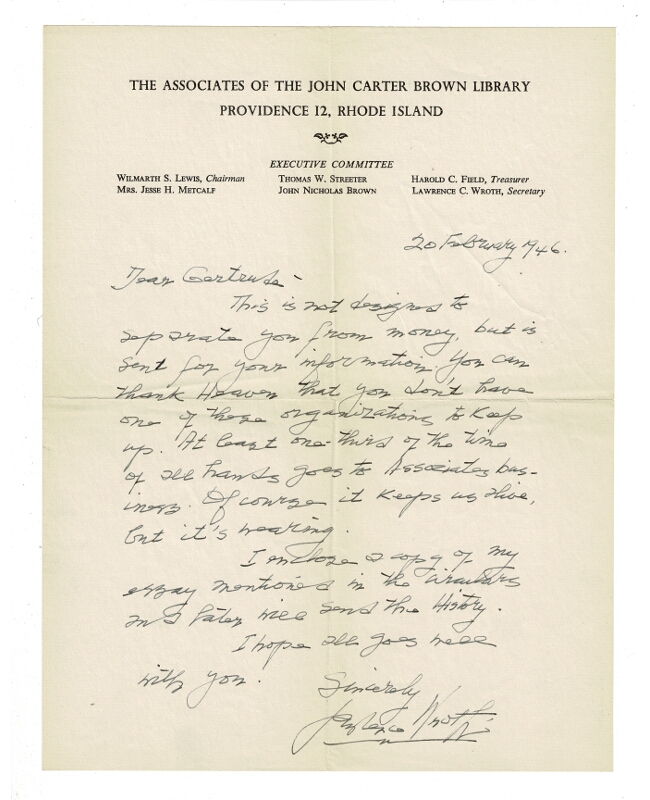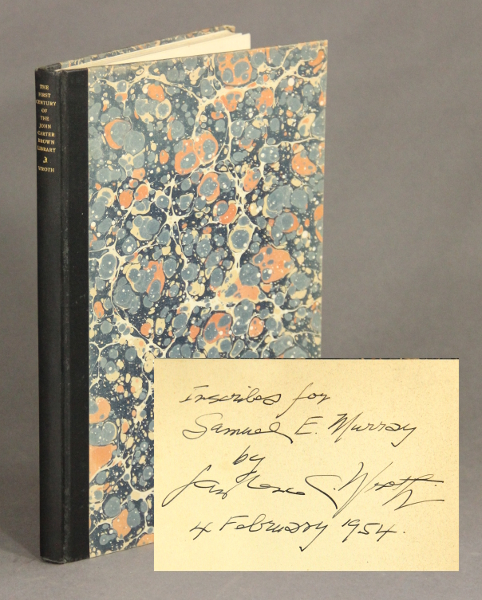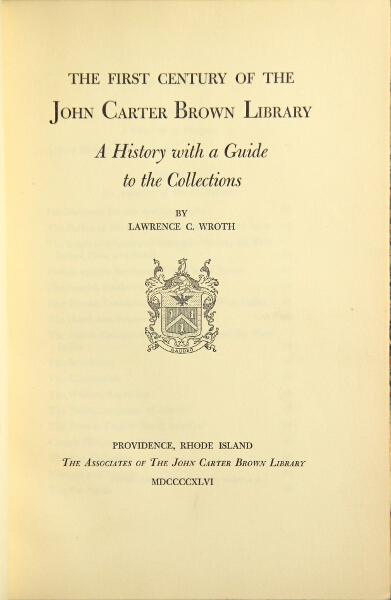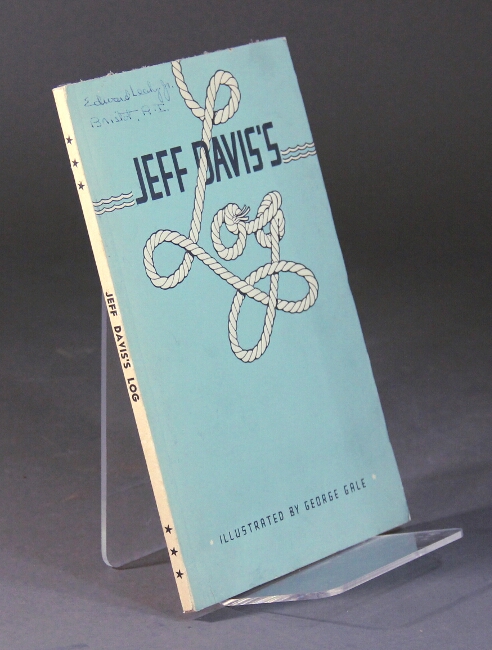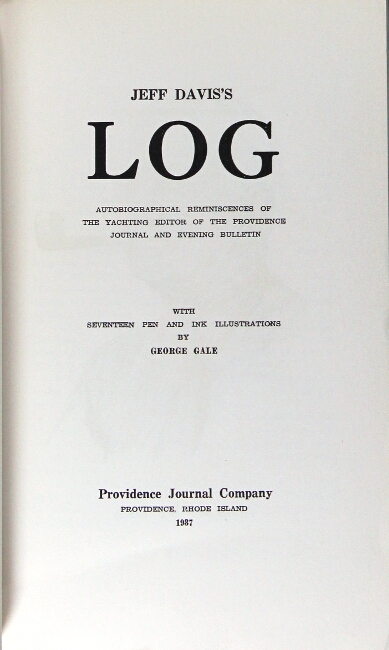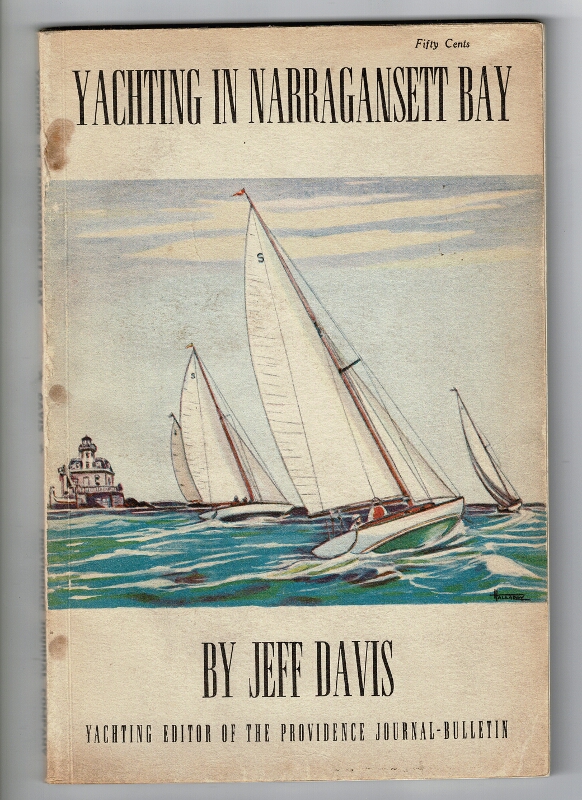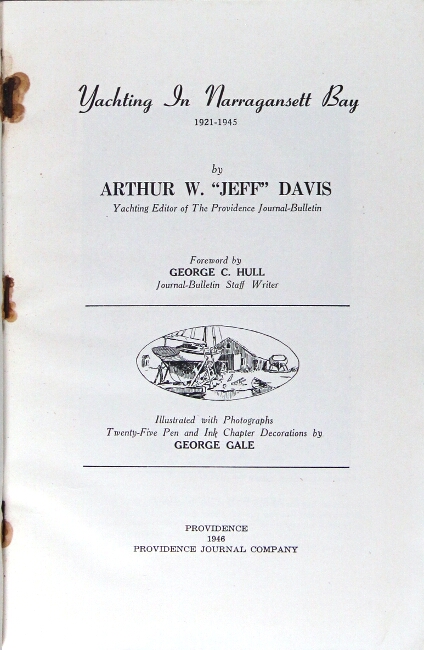801. The influence of William Morris and the Kelmscott Press. As shown by an exhibition of books from the later English presses, at the John Carter Brown Library. Providence: [publisher not identified], 1912.
$150
First separate edition, reprinted from the Brown Alumni Monthly for March, 1912; 16mo, pp. 16; contemporary black cloth-backed green paper-covered boards; near fine.
Signed by Stillwell on the title page.
802. The pageant of Benefit Street down through the years. Providence: Ackerman-Standard Press, 1945.
$125
First edition, 8vo, pp. 143, [1]; map endpapers, vignette title page and 15 vignette illustrations by the author; nice copy in the dust jacket with one short tear at the top of the spine.
Presentation copy, "Inscribed for Emilie Wildpritt with my love Margaret B. Stillwell."
In 1931 and 1940 Stillwell wrote pioneering books on incunabula relative to America and American libraries, one of the first women to do so. This very appealing reconstruction of a very literary Providence street was doubtless inspirational in the movement to preserve the heritage and the homes of this area.
803. Vignettes and rhymes on the times. Observations of a bookworm. [Providence: Brown University], 1986.
$225
First edition limited to 100 copies printed by the Anthoensen Press, Portland, Maine; pp. [2], 31, [1]; portrait frontispiece of the author; fine in original green cloth, gilt-lettered spine.
Posthumously published.
Original prospectuses for two other Stillwell books laid in, plus 2 typed poems, "Dialogue on the Ark," with a presentation inscription at the top of the first sheet, and a dated signature at the end of the poem on the second sheet; and "Said Mrs. Japhet to Mrs. Ham," a single sheet signed and dated by Stillwell at the bottom.
804. While Benefit Street was young. Providence: Ackerman-Standard Press, 1933.
$100
First edition, small 8vo, pp. 37, [1]; vignette title page and 4 vignette illustrations by the author in the text; fine copy in a fine dust jacket, and as the jacket is known for its fragility, uncommon thus. Original prospectus laid in.
805. Two centuries of Rhode-Island legislation against strong drink [wrapper title]. A sketch of Rhode-Island legislation against strong drink . Providence: Sidney S. Rider, 1882.
$75
First separate edition (the article previously appeared in an unnamed newspaper); 8vo, pp. 50, [2]; fine in original salmon wrappers.
Parks 1039.
806. Stonington Regatta! A regatta will come off at Stonington, on Thursday, August 4th, at 11 o'clock A.M. open to all boats and vessels, under the following classifications and regulations. Westerly, R.I.: J. H. Utter & Co., n.d., [1890s].
$1,250
Broadside (approx. 12¾" x 7½"); details measurement rules, prizes, and sailing directions all in a single column beneath the running head; lightly toned, previous folds, else near fine.
An 'X' in the margin next to the section on rules, is keyed to an 'X' at the bottom where it is written in ink: "The 2, 3, 4 class boats allowed to shift ballast; but not to take any in, or discharge, during the race." James I. Day, C. T. Stanton, and H. L. Niles comprise the race committee.
Not in OCLC.
807. Thomas March Clark fifth Bishop of Rhode Island. A memoir by his daughter ... Edited by Latta Griswold ... with a preface by James De Wolf Perry. Milwaukee: Morehouse Publishing Co. & London: A. R. Mowbray & Co., [1927].
$75
8vo, pp. xii, 235, [1]; frontispiece portrait and 14 plates (1 folding); original blue cloth stamped in gilt on upper cover and spine; near fine.
This copy with a presentation from the author to Mary B. Peckham dated January 1935. Clark (1812-1903) served as Bishop of Rhode Island from 1854 until his death.
808. [Suffrage.] Defense of Rhode Island, her institutions, and her right to her representatives in Congress. Speech by ... in the Senate of the United States, February, 1881. Washington, D.C.: [publisher not identified], 1881.
$75
8vo, pp. 35, [1]; original printed gray wrappers; very good.
Presentation stamp on the verso of the title page.
Anthony argues against those who have asked Congress to interpose its authority in guaranteeing a republican form of government in Rhode Island on account of Rhode Island's constitutional limitations on suffrage.
809. Civil government of Rhode Island. Joint rules and orders, and rules and orders, committees, &c., of the Senate and House of Representatives, for the political year 1881-82. N.p., n.d. [likely Providence: 1881].
$275
12mo, pp. 36; straight-grain black limp morocco with gilt-ruled sides, "Royal C. Taft" in gilt central on the upper cover; near fine throughout.
With ruled blank sheets for "Memoranda" bound in at end, and containing the signatures of Gov. Alfred H. Littlefield, Lt. Governor Henry H. Fay (both dated 1882), plus the signatures of approximately 70 other Rhode Island legislators from the House and Senate, on 11 pages, most with place of residence.
Taft, a Representative from Providence, has signed the list along with his colleagues. He was elected Governor in 1888. A manuscript list of names (prospects?), most with check marks, probably in Taft's hand, is laid in. A choice memento of the 1881-82 Rhode Island legislative session.
810. [Tax and Income Records.] List of incomes earned in ... Rhode Island, in 1864, and taxed in 1865. Providence: N. Bangs Williams, [1865].
$150
First edition, 12mo, pp. [2] ads on yellow paper, 160, [2], [6] ads; 5 leaves of ads (2 on yellow paper) inserted throughout the text and outside the pagination; original printed boards, neatly rebacked in black cloth; ink stain at the top fore-edge causing a few short tears; all else very good and sound.
Contains alphabetical lists of taxpayers by town, with income and amount of tax paid. Among the ads here is one for the publisher (and, presumably, compiler) who doubled as an "Importer and Wholesale Dealer in French, German, English, and American Fancy Goods, Perfumery, Yankee Notions, and Smokers' Articles" at his Westminster St. address.
811. [Tax Revenues.] A list of persons accessed in the town tax of forty thousand dollars, voted by the freemen of Providence, June, 1827. With the amount of the valuation and tax of each. Providence: Hutchens & Cory, September, 1827.
$225
First edition, 12mo, pp. 40; original printed tan wrappers; clean tear in pp. 13-14, otherwise near fine throughout.
Signature on the title page of W. A. Greene (i.e. Welcome Arnold Greene).
Not in OCLC; American Imprints 30379 (R.I. Historical only).
812. [Temperance Society.] Report of the Rhode-Island State Temperance Society, for 1843. Providence: B. T. Albro, printer, 1844.
SOLD
12mo, pp. 24; self-wrappers; removed from binding; very good.
With the ownership signature at the top of "James P. Dickney, Providence, R.I."
See Sabin 70737 for the run of these annual volumes beginning in 1831.
813. [Temple, John, Surveyor General of Customs.] Manuscript resolution not to admit officers appointed by John Temple, Esq. (1732-1798) by Rhode Island colonial officials. N.p., n.d. [Rhode Island: ca. 1760s.].
$275
Single sheet approx. 7½" x 6", 16 lines in ink; slightly browned, very good.
John Temple, a British Imperial official, was born in Boston, Massachusetts, in 1732, the son of Robert Temple, a colonial entrepreneur, and Mehitable Nelson. He grew up on the family "Ten Hills" estate near Boston; but spent much of his early adulthood in London, seeking a lucrative appointment through Richard Grenville, Earl Temple, and his brother George Grenville, later to be prime minister.
In 1761 he was named Surveyor General of Customs for the northern district of America, with supervision of all the customs officers from Newfoundland to New Jersey, and lieutenant governor of New Hampshire, a position with neither pay nor duties "that was created purposely," he said, "to give me Rank in that Country." This document is a resolution by officials in the colony of Rhode Island who claim that Temple had not taken the necessary oaths required to appoint officials in the colony and it is resolved "that those officers not be admitted & sworn in this colony until Mr. Temple by whom they are appointed hath first duly qualified himself for the Executor of his Office... and when the said Surveyor General himself hath been duly sworn in and Shewn the Governor his Authority...then upon their Application they be also sworn."
Temple was a controversial figure, known for his epic fight with the royal governor of Massachusetts, Francis Bernard, whom he accused of collusion in extortion and fraud. Temple later was accused of theft of certain letters with which Benjamin Franklin was also inveigled. This document is a good example of the resistant and oppositional behavior of the colonies, and Rhode Island in particular, in the years leading up to the Revolutionary War.
814. A summary view of God's gracious covenant with Abraham and his seed; of the right and design of the baptism of infants; and of the mode of baptism. In four discourses. Newport, R.I.: printed at the office of the Newport Mercury ... delivered to subscribers, and sold by Samuel W. Vinson, no. 74 Thomas-Street, 1808.
$375
First edition, 8vo, pp. 96; contemporary gray paper wrappers, neatly rebacked; library pressure stamp in title page; very good.
Tenney was pastor of the First Congregational Church, Newport, from 1804 to 1815. He also published a discourse on The Intemperate Use of Ardent Spirits (1814). The Mercury was at this time (1808) conducted by Ann Barber.
American Imprints 16299; not in Bartlett; Hammett, pp. 142-43.
815. In memory of Reverend Roderick Terry, D.D. President 1918-1933 [as issued in the Bulletin of the Newport Historical Society, no. 91 for April, 1934]. Newport: Newport Historical Society, 1934.
$50
8vo, pp. 26; portrait frontispiece; original printed wrappers bound in three-quarter blue morocco by James MacDonald, gilt-lettered direct on spine; fine.
Leather bookplate of Frederick Marquand Godwin, the great-grandson of William Cullen Bryant.
Terry (1849-1933) was president of the Society from 1918-1933 and was a well-known collector of books and manuscripts.
816. [Textile Industry.] Rhodes & Smith Woollen Factory. Printed receipt, signed by Dorrance. Pawtuxet: July 25, 1818.
$150
Manuscript receipt (approx. 2¾" x 7½"), ink bright and legible.
From the earliest beginnings of the textile industry in Rhode Island. Rhodes & Smith were the well-known Christopher and William Rhodes and Elisha P. Smith (1777-1832). The Rhodes brothers, who advertised as spinners, clothiers, and carders of wool, were very successful textile manufacturers. They were noted for producing the first woolen broadcloth in America made from the wool of sheep imported from Norway.
This receipt shows a $1.75 payment to George Cary "for childrens (sic) work in factory up to this date...payable in goods." It was common before labor reform for minors to be employed the early textile mills. Signed "For Rhodes & Smith, T. Dorrance," i.e. Tully Dorrance (1784-1861), a son of Samuel Dorrance II and Anne Tully. He married Sally Fear Rhodes, and went on to acquire The Pomfret Cotton Manufactory in Connecticut.
817. [Textile Industry.] A singular archive containing approximately 2250 items. Providence & Whitinsville, Mass., [et al.]: early 1840s-late 1860s.
SOLD
A massive archive of items from this important Massachusetts / Rhode Island textile and machine manufactory which represents the pinnacle of industrial achievements of New England through an era that spans nine U.S. presidents, the Mexican War, the Gold Rush, Panic of 1857 through the end of the Civil War. The company town of Whitinsville (14 miles from Worcester and 29 to Providence) was developed by and named for this company which also had southern offices in Charlotte, NC, and Atlanta, GA. The relationships between this section of Massachusetts and points in Rhode Island involve the importance of the water power of Massachusetts, the port of Providence, and the interconnections of the Blackstone Valley Industrial Corridor.
The Whitin Machine Works was founded by Paul Whitin and his sons in 1831 in Northbridge, Massachusetts. The village of South Northbridge became known as Whitinsville in 1835, in honor of its founder. The WMW became one of the largest textile machinery companies in the world. Known as The "Shop" to locals, it would operate well into the 20th century, long after many of the New England mills had moved South. By 1948, The company was operating at peak capacity, employing 5,615 men and women. (See Wikipedia for an abbreviated history.)
The core collection contains approx. 950 items, 1843-1863, including 600 pieces of correspondence and about 350 billheads, receipts and ledger sheets. A few highlights among the main group are about 25 items relating to the purchase of a Corliss Steam Engine from Corliss & Nightingale in Providence. Several boilers were built starting in 1849 and a letter from 1856 shows a bill of $881.00. George H. Corliss' engines were the industry standard of the time and were exhibited at the Centennial Exposition in 1876. Another group relates to the 1847 construction of the Whitin Machine Shop, and includes 14 autograph letters signed by renowned Boston architect Gridley J. F. Bryant. There are also items relating to the 1849 purchase and plan of the Uxbridge Cotton Mill and the Rockdale Cotton Mill, as well as the 1845-7 construction of the Whitinsville Meeting House, its minister (L. F. Clark) and its bell.
A subsection includes items from Dexter Thurber of Providence, then part owner of the Manchaug Mills in Sutton, MA, home of Fruit of the Loom. The letters refer to the dam and the height of the water on Manchaug Pond from which the Whitin Co. was drawing water power. There are also items concerning the installation of lighting, gas, and heating systems, telegraph service, water wheels, an ice house, and fire engine. The fire engine was bought of Thomas Aldrich for $285 in 1862 in Providence. During the great Irish famine, the Whitin company and the town of Northbridge donated $705.00 for the "relief of starving population" (receipt dated March 2, 1847).
At the start of the Civil War in 1861, James A. Potter wrote to Paul Whitin & Sons offering to furnish a flag staff "33 ft long made complete for $35 delivered on the cars". There is also a letter from J. G. Dudley & Co., New York, 1852, requesting a history of the company's capper and spreader and similar inventions for a speech on the "History of Cotton Manufactures" to be read before the New York Historical Society. Also included are two autograph letters signed by educator William A. Alcott (1798-1859, cousin to Bronson Alcott), an MD who lectured on topics such as the evils of tobacco use as early as 1836. He was scheduled for a lecture at Whitinsville in November of 1848.
There are nine letters concerning Providence & Worcester Railroad (Paul Whitin was on 1844 founding committee) service between 1844-5. There is a large group of correspondence and receipts on construction of various buildings and projects; "stone posts for green house, buttresses, stones for piazza mantel, etc." A few of the suppliers involved were W.F. Merrifield of Worcester, Tingley Bros. of Providence, Richmond & Potter of Worcester, and Whitney & Russell of Worcester. There are engraved billheads and receipts from Providence Steam and Gas Pipe Co. (1851-1864) as well as a series of letters (1862) from the New York offices of Addison Smith, dealer in the McKenzie Patent Blower, Patent Cupola, and smelting furnace, gas exhauster and compensator. H.Q. Hawley (Henry Quackenbush Hawley, Pres. of the Auburn Gas Co.) writes long detailed letters (1858-1862) from Albany, NY, on furnaces, cracks in fire chambers, castings, and coal. There is also a series (14 items) of correspondence (1846-1850) from Walworth & Nason, of Boston. James Nason and his brother-in-law James Walworth of Boston, are considered to have introduced/invented indoor heating and ventilating. Nason coined the word "radiator." Also included is a brochure (1850) from Ball & Co.'s Patent Indestructible Water Pipe and an autograph letter signed by J. Ball.
There is a series of correspondence (approx. 55 items) relating to fire insurance, mostly from the office of the Boston Manufacturers Mutual Fire Insurance Co. which had a branch in Providence. There is a set of personal and business correspondence (1843-50) from Whitin cousin Joseph A. Dudley (1815-1884) of Rome, New York, head of the wholesale (drugs, medicines, chemicals) house of Dudley & Stafford. John C. Whitin was operating the Holyoke Machine Shop in the 1860s and wrote about 70 letters (1854-62), to his brothers in Whitinsville on business. There are equally as many other items relating to the Holyoke Machine Shop from other correspondents.
Approx. 400 items 1843-1865, from Seth Adams of Providence, including 200 items of correspondence; Seth Adams Jr., a dealer in flour and corn, 53 So. Water St., Providence, had many dealings with the company. Included are a series of autograph letters signed 1848-1865. "Messrs. P. Whitin & Sons, I have sent you the only perfect white corn in Providence, price .85 which it has been for a month... Maryland yellow is .80". He also writes of various shipping possibilities; the schooner John R. Mather, the Bay State, the Tryall, the Roxbury, the sloop James L. Long, etc. sailing coastwise from Baltimore.
Approx. 305 items 1843-1859 mostly 1840s, from Alexander Fales Adie (1811-1890), wholesale dealer in everything from drugs and medicines to oils, varnishes, perfume, soap, pickers, shuttles, and glue, who was established at 23 Market St. in Providence. His letters contain much information on supplies used in the textile trade. "Oct. 2, 1849. Messrs. You will find 1/2 # Fish Sounds which I am selling in place of Russian Isinglass. I have sold 15# of them to a person here who covers (?) rolls and he said he found them equal to Russian Isinglass for cement... I thought you might like a sample as you use considerable Russian Isinglass. They are dissolved in New Rum or Alcohol best I understand." (Isinglass is a semitransparent whitish substance consisting of a very pure form of gelatin, produced from the sounds (swimming bladders) of the sturgeon - used as clarifying agent). Adie was an excellent salesman, constantly sending out free samples and suggesting the latest materials for the Whitins to use.
Approx. 200 items from S. & W. Foster of Providence, 1843-1866 including 62 pieces of correspondence; Samuel and William Foster, grocers and agents in cotton machinery, represent about 200 items including 62 letters (1843-1866) & receipts. They were both born in MA, but operated out of Providence, supplying everything from lard, butter, and tobacco and also purchasing looms, pickers, and carders. "Nov. 4, 1848. Gent. We are this day receiving about 250 packages of very yellow waxy sweet butter made by the Scotch farmers in the northern counties of York State. They are in dairies of 5 to 20 tubs, one dairy in particular of 18 firkin is very good and we could sell it for 17ct..."
Approx. 350 items from S.W. Razee of Providence, RI, 1855-1869, including 90 pieces of correspondence: Stafford W. Razee (1827-1906), a grain merchant and agent of the Harris Woolen Co. Razee was also a state senator and railroad director and erected the first steam grain elevator in Providence. There about 350 items (1855-69), most from 1840s, including about 90 autograph letters signed. "Woonsocket Dec 15th, 1869. I notice your quotations of corn came from Prov and are very much obliged for the information and this is not the first time that my Prov friends have given low quotations to my customers when they knew they had first purchased of me. The facts of the case are that the Prov grain dealers are determined to drive (double underlines) me out of the business... and do all in their power to create dissatisfaction among those who purchase grain of me..." Perhaps this is a reference to Seth Adams! A wonderful collection of nineteenth century business records from an important New England company.
A fat manila file containing perhaps 75 related letters, receipts, billheads, etc.
And, A Trip Through the Whitin Machine Works, Manufacturers of Textile Machinery. Whitin Machine Works, Whitinsville, 1925, which gives an overview of the company from its 1790 founding by Paul Whitin, the blacksmith, to Col. Paul Whitin who expanded the company into a 1500 spindle cotton mill, and John Crane Whitin, son and master mechanic, who developed the production of patented textile machines.
818. A history of the Declaration of Independence. A story of the American patriots who brought about the birth of our nation. Bristol: published by the author, 1947.
$35
8vo, pp. xiv, 132, [2]; original red cloth stamped in gilt on upper cover and spine; spine a little sunned, else very good.
819. The Hopkinsian Magazine, for the years 1824 and 1825. Providence: Carlile & Brown, February 1824 to December, 1825.
$125
8vo, pp. [4], [25]-572; contemporary calf-backed marbled boards; edges stained yellow; considerable browning to the prelims, the calf rubbed along the hinges; all else very good.
With the exception of the first issue, this volume contains the complete first two years, together with a general title page and index; the publication lasted until 1832 (although suspended during 1830). Samuel Hopkins was a pupil and close friend of Jonathan Edwards who carried the principles of the New Divinity to its most rigorous conclusions, and for him the movement was named.
Not found in American Imprints or Bartlett.
820. Tiverton Heights: Tiverton, R.I. Its historic surroundings, and its beautiful scenery. [Fall River, Mass.: The Daily Evening News Print, n.d., 1884.].
$125
16mo, pp. 19, [1]; original printed tan wrappers; near fine.
A loose leaf is laid in, as issued, detailing the Free Public Library which "contains over 1000 volumes, and is yearly increasing in interest and value through the appropriations from the state and donations from friends and patrons..."
OCLC locates the Brown and John Hopkins copies only, and without mention of the supplemental leaf.
821. [Tiverton.] Two-page holograph petition to the town of Tiverton concerning a deed. Tiverton: March 25, 1772.
$200
Approx. 7½" x 8", previous folds, some browning; all else very good and legible.
Benjamin Sheldon of Tiverton sent this petition to the town meeting asking that his land rights be extended.
"Whereas yor petit. having, together with his son, purchased a Dwelling house standing on the Bank of Commonage, next the North End of Nanquaket pond as also One Right & Three Quarters of a Right in the Commons & beeches lying along Shore from Sineflesh River so called till it comes to the Ministries lot."
He complained that he could not "erect a garden or yard to plant greens or any kind of Same" (since his land was remote from his house) and he petitions to change his right and three quarters to the area surrounding the house. The town council granted his wish pending no prior right or title to the said land.
This Benjamin Sheldon may be Rev. Benjamin Sheldon and Sarah (Greenwood) Sheldon of the Baptist Church of Pawtuxet and later Seekonk. Benjamin was born in 1735 in Rehoboth, Mass., and moved to Tiverton and later Rehoboth, dying in 1815.
822. Charter of the Trinity Church, in Newport, R.I. with the constitution of the Protestant Episcopal Church, in the state of Rhode-Island. Newport, (R.I.): printed by Wm. & J. H. Barber, 1823.
SOLD
First edition, 8vo, pp. 8; self-wrappers, stitched, as issued; near fine.
Following p. 6 is an inserted leaf "Amendment of the charter of Trinity-Church."
American Imprints 13584; Bartlett, p. 261; only two copies in OCLC: NY Historical and AAS.
823. Life and remarkable adventures of Israel R. Potter, (a native of Cranston, Rhode-Island,) who was a soldier in the American Revolution, and took a distinguished part in the Battle of Bunker Hill (in which he received three wounds,) after which he was taken prisoner by the British, conveyed to England, where for 30 years he obtained a livelihood, by crying "Old chairs to mend," through the streets of London.... Providence: printed by J. Howard, for I. R. Potter (price 31 cents), 1824.
$250
12mo, pp. 108; wood-engraved frontispiece within the pagination; contemporary and likely original calf-backed marbled boards; ex-City Library Association (Springfield, Mass.) with bookplate, pressure stamps on the first three leaves and an old unobtrusive sticker on the spine; good and sound.
The first edition of the same year was published by Trumbull himself, was sold at 28 cents and bore a different frontispiece. Herman Melville purchased a copy of this title sometime before 1849 as noted by Sealts and used it liberally as a source for his book Israel Potter (New York, 1855).
Ostensibly, Potter served in Capt. Edmund Johnson's company, 1st R.I. regiment at Bunker hill; later being transferred to the brigantine Washington. The vessel was captured and the crew taken to England (where he met Ben Franklin and George III) and where Potter escaped from his captors.
Sealts, Melville's Reading, 407; Howes T-371: "Purported autobiography of dubious authenticity." Not in Bartlett. American Imprints 17677; Sabin 97200.
824. The belle, the blue and the bigot; or three fields for woman's influence. By the author of Wreaths and Branches for the Church, &c. Providence: Samuel C. Blodget, 1844.
$150
First edition, 16mo, pp. 322; original blind-stamped green cloth, gilt-lettered spine; front free endpaper excised, last leaf nearly loose, spine ends slightly chipped; all else very good and sound. Bookseller's ticket of Jordan & Co., publishers, in Boston.
The Belle, or, Woman's Influence in Society; The Blue, or, Woman's Influence in Literature; and, The Bigot, or, Woman's Influence in Religion.
"Educated in seminaries for young ladies in New Haven and Litchfield, Connecticut, Louisa Caroline Huggins Tuthill apparently expected to settle down into an unexceptional life as a lawyer's wife, but a religious experience caused her husband to give up the law for the ministry and an attack of typhoid fever forced him to give up the ministry for a brief attempt at publishing a literary magazine. Tuthill encouraged his wife to write. After his death in 1825, she began to write steadily and seriously in order to support herself and her four children ... A popular author, whose works often ran to many editions and were reprinted in England, Tuthill wrote with a clear intention to instruct, to edify, and to raise the moral tone of the women and children who read her books" (encyclopedia.com).
Wright I, 2624.
825. A history of the Episcopal church in Narragansett, Rhode Island; including a history of other Episcopal churches in the state; with an appendix containing a reprint of a work now extremely rare, entitled: America dissected by the Rev. James MacSparran, with notes containing genealogical and biographical accounts of distinguished men, families, etc.. New York: Henry M. Onderdonk, 1847.
$125
First edition, 8vo, pp. [5], vii-xvi, [1], x-xxxiii, [2], 36-533, [1]; portrait frontispiece, one other portrait plus other illustrations in the text; later three-quarter red morocco a bit rubbed at extremities otherwise very good.
Afro-Americana 10679; Sabin 47069.
826. [Updike, Wilkins.] To the electors of the Western Congressional district. The Hon. Wilkins Updike, of South Kingstown, is now a candidate to represent you in the next Congress of the United States. [Providence?: publisher not identified, 1847.].
$375
Folio broadside (approx. 19" x 12¾"), text in quadruple column beneath the running head, signed in type at the end of the last column, "A Citizen of Narragansett." Some foxing and a sliver of browning at the top right corner; small hole in center affecting two words; all else very good.
Endorses Wilkins Updike of South Kingstown for the U.S. Congress, and attacks his rival, J. W. Richmond. Updike was a member of the Constitutional Convention of 1842. A Whig, he protected the agrarian interests in the southern part of the state. In another broadside Richmond claims Updike wrote this one himself. This broadside discusses some of his past political achievements. An opponent of Dorr and the Dorrites, he was not elected to Congress.
Clements, Brown, and AAS in OCLC. DeSimone & Schofield 183 (adding R.I. Historical).
827. Read! Wake up before it's too late! Speech of Mr. Updike upon the resolution to discharge the committee selected by a board of managers to report upon the "registered state debt," May session, 1842. [Providence: publisher not identified, 1842.].
$850
Folio broadside (approx. 19¼" x 11½), text in quadruple column under the running head; previous folds; near fine.
Published the same year as his Memoirs of the Rhode Island Bar.
AAS only in OCLC; not in American Imprints, Bartlett, or Sabin.
828. Public addresses 1872-1922. Boston: Lothrop, Lee & Shepard Co., 1923.
$25
8vo, pp. iv, 203, [1]; original blue cloth, printed paper label on spine; fine copy.
Inscribed "To my friend Charles T. Howard with kind regards & best wishes, Walter B. Vincent / Providence, R.I., October 25, 1923."
Vincent (1845-1931) was a Providence lawyer, clerk of the Rhode Island Senate, and a state representative in the Rhode Island General Assembly.
829. The history of my life; an autobiography by William Vincent, master mariner, Bristol, R.I. ... In two parts. Printed for the author. Providence: A. Crawford Greene, steam book and job printer, Railroad Halls, 1874.
SOLD
12mo, pp. 31, [1]; original printed yellow front wrapper (the fore-margin a bit erose), rear wrapper wanting; good or better.
A brief account of Vincent's exciting life. As a lad he goes a-whaling, and eventually finds himself on slave ships. He survives the great gale of September, 1815, on the Matilda, Captain Eddy, bringing back to Rhode Island "molasses, etc." He is shipwrecked in the Bahamas. He loses his wife, and sets to writing.
OCLC locates only three physical copies: N.Y. Historical, San Francisco Maritime Park, and Brown.
830. [War of 1812.] Memorial from the Rhode-Island Regiment of Drafted Militia, War of 1812 [drop title]. N.p., n.d. [Providence?: publisher not identified, 1854.].
$45
8vo, pp. [8] self-wrappers, stitched, as issued; first page spotted, else very good.
With the Resolutions passed by the General Assembly.
Not found in Bartlett. Sabin 70597.
831. [War of 1812.] Discourse, for the month of April, A.D. 1816. Providence: printed by Miller & Hutchens, 1816.
$35
8vo, pp. 24; modern wrappers; very good.
Using the War of 1812 as a backdrop, this sermon goes on about all that God has done for the country.
American Imprints 39833; not in Bartlett, although two much later works of his are.
832. [Ware, Harriet.] A memoir of Harriet Ware, first superintendent of the children's home, in the city of Providence. Providence: George H. Whitney, 1850.
$100
First edition, 12mo, pp. v, [3], 151, [1]; original brown blindstamped cloth, gilt lettering on spine; engraved frontispiece of Harriet Ware; slightly rubbed, some offsetting of the portrait, front free endpaper excised; all else very good.
Ware (1799-1847) was called to teach at India Point, a tough section of Providence, in 1834. The following year, with the assistance of Wayland, President of Brown University, she established the Providence Children's Friend Society, the oldest child welfare organization in Rhode Island. The text here consists mostly of extracts from Ware's correspondence tied together by Wayland's commentary.
833. [Warren Gas Light Company.] Five-year lease of the Warren Gas Light Company to William J. Miller. [Bristol County]: April 18, 1875.
$75
Folio, 3 pages on integral leaves, signed with seals on p. 3 by W. R. Lawton, president and treasurer respectively of the Gas Company, William J. Miller, and D. V. Gardner, witness. Previous folds, else fine.
Terms of the lease stipulate a term of five years, and include the company's gas house, coal and lime sheds, holder house, "and all permanent fixtures required for the manufacture, storage, and distribution of gas." And the company furthermore agree that they will keep in proper repair the building, the holders and tanks, the hydraulic mains, washers, etc.; and that Miller agrees to make all the necessary repairs on the street mains, and agrees to pay $2500 "for a consumption of two and one half million feet," and $3000 "for a consumption of three million feet, per annum, and a pro-rated rate for any amount between the amounts named."
834. [Warren.] Program and book of words of the pageant of Warren ... Historical notes by Virginia Baker. Pageant given by the people of Warren, assisted by people of Swansea, Barrington, and Bristol in honor of the one hundred and fiftieth anniversary of the founding of the First Baptist Church of Warren - the founding of Rhode Island College, now Brown University - and also in celebration of the setting off of the town of Warren at Maxwelton, the estate of James Maxwell Wheaton, Esq. of Warren. First Baptist Church of Warren, [Snow & Farnum & Co., printers], 1914.
$40
8vo, pp. 32; 6 full-page illustrations from photographs; original pictorial brown wrappers; very good.
An historical play about the smallest town in the smallest county in the smallest state, with appearances by Miles Standish, George Washington, Massasoit, and the lovely Ms. Warren.
835. [Warren.] 200th anniversary of Warren, Rhode Island. Historical sketch 1747-1947. N.p.: [Town of Warren, 1947.].
$50
8vo, pp. 111, [1]; frontispiece, illustrations in the text; original maroon cloth stamped in gilt on upper cover; spine a little sunned, else fine.
The smallest town in the smallest county in the smallest state.
Parks 3944.
836. Constitution, by-laws, sailing regulations, &c. of the Warwick Yacht Club, of Providence. Providence: J. A. & R. A. Reid, printers, 1876.
$175
16mo, pp. 41, [1]; pages ruled in red throughout; 2 chromolithograph plates of burgees and private pennants, lists of members and officers; original pictorial blue cloth stamped in gilt on the upper cover with the club's monogram; some light staining to the upper cover, but generally very good.
The Vice-Commodore Rowland Gibson Hazard's copy, with his bookplate. Hazard (1801-1888) served three terms in the R.I. House of Representatives.
Not in OCLC.
837. [Washington Eulogy.] An oration pronounced at the Baptist Meeting House in Providence, on Tuesday the seventh of January, 1800, at the funeral ceremony on the death of George Washington. Providence: printed by John Carter, [1800].
$125
8vo, pp. 15, [1]; uncut and unopened; original drab paper wrappers; fine.
Alden, Rhode Island, 1662; Evans 37070; Stillwell, Washington Eulogies, 46.
838. On the principle of vitality. A discourse delivered in the First Church in Boston, Tuesday, June 8th, 1790. Before the Humane Society of the Commonwealth of Massachusetts. Boston: printed by Thomas and John Fleet, 1790.
$750
8vo, pp. [4], 24, [4]; removed from binding, wrappers wanting; trimmed and a bit toned; all else very good.
With leaf of appendix and list of members at the end, among whom Elbridge Gerry, Robert Treat Paine, and Paul Revere.
Waterhouse (1754-1846) was a native of Newport, Rhode Island, and studed in both London and Edinburgh, and lived with John Adams in Leyden, and was later a professor of physic at Harvard. "As early as 1782 he suggested the formation of a humane society in Rhode Island, similar to those already active in Europe, and in 1785 he drew up plans, with Dr. Henry Moyes of Edinburgh, for the Humane Society of the Commonwealth of Massachusetts. After some friction with other founding members, he gave a discourse, June 8, 1790, on The Principle of Vitality, showing the importance of long-continued artificial respiration" (DAB).
Austin 2011; Evans 23038; Sabin 102061.
839. Cautions to young persons concerning health in public lecture delivered at the close of the medical course in the Chapel of Cambridge Nov. 20, 1804; containing the general doctrine of chronic diseases, shewing the evil tendency of the use of tobacco upon young persons; more especially in the pernicious effects of smoking cigars; with observations on the use of ardent and vinous spirits in general. [Cambridge, Mass.]: printed at the University Press by W. Hillard, 1805.
$2,500
First edition, 8vo, pp. 32; original blue wrappers; old fold, wrappers chipped and torn, with ink stain penetrating three leaves of text, but not obscuring meaning.
With a gift inscription from the poet and lawyer Richard H. Dana, to his grandfather, William Ellery, a signer of the Declaration of Independence from Rhode Island. The contemporary ink title on the front wrapper ("Waterhouse on the pernicious effects of Tobacco") is in Ellery's hand, and so likely many underlinings and tick marks in text.
A speech on the many dangers of smoke and drink. It ends with "abandon the custom, lest you pierce with anguish the hearts of your affectionate parents!"
Waterhouse was born and raised in Rhode Island, and after receiving a medical education abroad became professor of the Harvard Medical School while lecturing at Rhode Island College. He was the first doctor to test the smallpox vaccine in the United States, applying it to four of his children. He is considered the most famous physician native to Newport.
"In addition to being the leading early champion of vaccination in America, he was the most important popularizer of science in New England from the 1780s to the early 1800s, the leading link between Boston and the British medical community during the quarter century after the revolutionary war, and an important literary figure." (ANBO)
840. Waterman's specific plaster, for inflammation, etc.. [Providence: 1842.].
$250
Broadside (approx. 11" x 6"), text in double column under the running head; light spotting, 3 old ink marks in the margin; very good.
Includes directions for use and five recommendations from prominent Rhode Islanders, including Edward Dexter, Thos. Cleaveland, M.D., the Atwood family, Benjamin Church, etc.
Not in OCLC or American Imprints.
841. [Wayland, Francis, Rev..] Discourse on the life and character of Rev. Francis Wayland, D. D. late president of Brown University. Delivered by invitation of the Alpha Zeta Society of Shurtleff College, Upper Alton, Ill, November 21, 1865. Alton, Illinois: S. V. Crossman & Co., college printers, 1866.
$75
First edition, 8vo, pp. 23, [1]; original yellow printed wrappers; front wrapper partially separated at the bottom, else very good.
842. A discourse in commemoration of the life and character of Moses Brown Ives. Providence: Knowles, Anthony & Co., printers, 1857.
$100
4to, pp. 27, [1]; original half brown morocco, gilt stamped on the upper cover; very good.
This is one of a few copies printed on large paper.
Ives was the long-time treasurer of Brown University.
Bartlett, p. 270 not mentioning the large paper issue.
843. The moral law of accumulation; the substance of two discourses, delivered in the First Baptist Meeting House, Providence, May 14, 1837. Providence: published by John E. Brown, 1837.
$150
8vo, pp. 35, [1]; removed from binding, wrappers wanting, all else very good.
The depression of 1837 was, according to Wayland, the result of God's wrath for the nation's investing its rapidly increasing wealth in leisure and licentiousness, rather than in cultivating the love of the beautiful, the true, and the good.
President of Brown University, Wayland championed the laissez-faire theory of economics. His book, The Elements of Political Economy, published the same year as this pamphlet, was the most widely used American text of its time, and reached many non-academics though abridgements in encyclopaedias.
"The immediate cause of the crisis, he explained in the Moral Law of Accumulation, was the intense fever of speculation and consequent overissue of notes and crtedit in the absence of a Bank of the United States" (Dorfman).
Not in Bartlett or Sabin; American Imprints 48397; Starr, Baptist Bibliography W-2009.
844. The Rhode Island question. Arguments of Messrs. Whipple and Webster, in the case of Martin Luther, plaintiff in error, versus Luther M. Borden and others, in the Supreme Court of the United States, January Term, 1848. Providence: Charles Burnett, Jun., 1848.
SOLD
First edition, 8vo, pp. 56; original printed brown wrappers; near fine.
The scarce Providence edition with both sets of arguments. The more common Washington edition published by Gideon gave only Webster's argument.
Luther v. Borden was an attempt to make the Supreme Court decide between the old government and Dorr's "convention" government in Rhode Island, following Thomas Dorr's conviction and sentencing for treason. The appeal made Dorr appear to be the legitimate government. Webster, replying for the defense called the challenge "novel and extraordinary." Chief Justice Taney evaded the issue by recognizing state law and state courts as completely competent. He further declared existing state authority legally empowered to use martial methods to maintain itself against violence.
One recent commentator, Erik J. Chaput (Providence Journal, 2/11/09) expresses the view that Luther v. Borden lent credibility to Lincoln's suspension of the constitutional right of habeas corpus. He writes: "The crisis that erupted in 1861 was undoubtedly one of law and order. In this one crucial aspect it resembled the 1842 Dorr Rebellion in Rhode Island, in which the followers of...Dorr...tried to replace the state's antiquated governmental structure....President John Tyler's support of the Law and Order Party after Dorr's attempt to forcibly implement the People's Constitution provided a powerful rhetorical precedent for subsequent actors in the Lincoln Administration and Congress two decades later....
"Going one step further than Lincoln, Atty. Gen. Edward Bates drew from an understanding of war-time powers as expressed in Luther v Borden (1849)...which arose from the Dorr Rebellion. The case represented a paramount constitutional question for Americans before the Civil War....'Much to the annoyance of Chief Justice Roger Taney, no friend of the Lincoln administration, Bates maintained that Taney's opinion in Luther justified the suspension of habeas corpus...."
Bartlett, p. 270; Cohen 12005; Sabin 70732..
845. [West India Trade - Charter Agreement.] Three-page manuscript charter agreement for the sloop Freetown for a voyage to Jamaica, between John Evans, owner of the sloop, and Samuel & William Vernon, the charter party. Freetown, Bristol County, Massachusetts Bay Colony: January 17, 1774.
SOLD
Folio, 3 pages on integral leaves (approx. 13" x 8¼"), docketed on the verso of the second leaf; signed by Samuel and William Vernon, John Evins (sic) and Joseph Evans. Previous folds, archival tape repairs; all else very good and legible.
A well detailed document showing the legalities involved in early Rhode Island ship charter to the West Indies. The chartering party, Samuel & William Vernon, were influential Newport merchants of the 18th and 19th centuries, and engaged in maritime trade from their base of operations in Newport. The brothers also played an important role in financing the creation of the United States Navy. William and Samuel formed a partnership that was active in the triangle trade: rum to Africa, slaves to the West Indies, and molasses to New England. The firm also engaged in privateering and had interests in several ships during King George's War.
This document, a charter party contract, was drawn between John Evans of Freetown, Massachusetts Bay, yeoman and owner of the sloop Freetown ("seventy- two tons ... now lying in the harbor of Newport ... Rhode Island Colony") and the Vernons. The sloop was to go on a voyage to Jamaica with a stop at Cape Nicola Mole at Hispanola. Pay was to be six shillings per ton monthly. If there were found to be any unlawful cargo loaded, a fine was to be charged to the Vernons of 1600 Spanish milled dollars. Evans was to be in charge of all the necessary ship fittings for a sea worthy voyage.
A month after the execution of this charter contract, an incident occurred near the Turks & Caicos involving the Freetown and Capt. Evans.
The Virginia Gazette from Williamsburg of April 14, 1774 reports "A letter dated at Turk's Island, the 20th of February, on board the sloop Freetown ... Joseph Evans master, bound to Jamaica, advises that the day before, as they were going through the [Windward] Passage ... they were boarded by a boat with eight armed men, from the Savage Man of War, then lying in the Road of Turk's Island. The Officer of the boat demanded of the Captain his Papers, which being readily delivered him, he ordered the Sloop to put about and sail for the Road, from which they were then of some distance to leeward, saying they would take the Boat in Tow. Mr. Finlater of Jamaica, the Captain, and a number of Gentlemen and Ladies, Passangers, expostulated with the Officer againjst the Hardship and Delay, especially as one of the Ladies (Mrs. Finlater) was great with Child, and near her Time.
"The Officer, however, insisted upon the Sloop's going to the Island, and on being refused behaved with great Brutality, treating the People on Board with the most scurrilous language, placing one of his own men at the Helm, and drawing his Sword. Mr. Finlater, wresting the Sword from him, threw it overboard, while the Captain forced the Boat's Man from the Helm, and gave it to one of his own People. The Boat along-side, then, by Order of the Officer, immediately fired into the Sloop with a Swivel Gun, whereby she was shot through the Side, and Mr. Finlater through the Body, near the Shoulder. The Sloop was then carried into the Road, where the Captain and Mate were detained on Board the Savage until next Day, when they were released, and permitted to proceed on their Voyage. The Surgeon of the Ship behaved with ... Humanity, and carefully dressed the Wounds of Mr. Finlater, whose recovery is doubtful ... The Officer had the least Reason for his Conduct, or acted from any other Motives than Pride ... ill-nature of Wantonness in the Exercise of an arbitrary Power, with which he ought not to have been trusted..."
The Vernon family divided during the Revolutionary War. Thomas was active as a Loyalist in Newport, while William and Samuel were active as Patriots. The British occupation of Newport forced William to leave in 1776. During the war William served as a member of the Navy Board of the Eastern Department, charged with building and supplying America's ships and maintaining registers of personnel. After the war William resumed his business activities and became involved in the local affairs of Newport as an overseer of the poor and an incorporator of the Redwood Library. In later years, William's son, Samuel, Jr. joined the business first as a ship's captain, and then as a partner.
846. [Whaling.] [Whaling contract:] It is here by agreed between the subscribers and J. W. Lowell, shipping agent, that we will leave this city for [Bristol, R.I.] by such conveyance as may be furnished us by said J. W. Lowell, and will on our arrival there, after having reported ourselves to [Byron Diman] of said Bristol enter on board [bark Anna] fitting for the whaling business.... Providence: December 12, 1844.
$700
Pro-forma document with columns for dates, names, stations, place of birth, age, sureties, witness to signing, and advance. Here 7 names have been entered, two of whom have been crossed out. Signed up and seemingly ready to go awhaling are Robert Laverty: carpenter, from Worcester, Mass., age 26; Howard Perry: seaman, Dighton, Mass., age 19; William F. Middleton: seaman, Portland, Maine, age 21; Horace D. Sherman: greenhand, South Kingston, R.I., age 20; and Oliver Howard: blacksmith, Bloomingburg, probably N.Y.), age 24. The witness in each case is B. L. Nichols and the advances were modest 1/125 or 1/130. The names crossed out are Benjamin B. Manchester, West Point, N.Y. and Joseph Silky from France.
Byron Diman became an owner of the Anne in 1828, and continued to own it with D'Wolf partners and others until the ship was surrendered in 1850 in San Francisco. She was 87 feet long, weighted 222 tons, and sailed to the Pacific January 2, 1845. She returned December 10, 1848 with 700 barrels of sperm oil and 100 barrels of whale oil.
This was lot 25 in the Barbara Johnson sale of her whaling collection in September, 1997: "This type of document is rarely encountered. Whaling firms used the services of agents to find the crew to man their whaling vessels. J. W. Lowell was such an agent, and if he was like his colleagues in the trade, he promised the world to unsuspecting greenhands. Lowell signed 7 men to the voyage, but crossed out the names of 2 on this document, suggesting that the men thought better of the idea. Whether the remaining 5 made it on board is unknown."
847. [Whaling.] Abstracts from a journal kept aboard the ship Sharon of Fairhaven on a whaling voyage in the south Pacific 1841 - 1845. Providence: privately printed, 1953.
$100
Edition limited to 250 copies, slim, small 4to, pp. 14, [1]; fine in original blue cloth-backed printed boards, unprinted tissue dust-jacket torn and defective.
A bloody mutiny aboard the Sharon, and a detailed thrashing of a sailor to his death.
848. The star of La Rochelle being the true story of the life of Esther Leroy wife of Gabriel Bernon 1652-1710. Providence: [privately printed], 1930.
$75
Edition limited to 300 copies signed by the author (this, no. 182), 8vo, pp. [iii]-ix, [1], 130, [2]; colored frontispiece, illustrations in the text throughout; original blue cloth stamped in gilt and silver on upper cover and spine; near fine.
Esther Leroy was the wife of Gabriel Bernon, a wealthy French merchant who with other Huguenots came to America in 1688 and established themselves on a 750-acre tract in Oxford, Massachusetts as a haven for Huguenot refugees. Bernon spent much of his time in Boston, where he became a successful merchant. The settlement of Oxford was ultimately abandoned after the Indians became too much of a threat, and in 1697 the family moved to Newport, R.I.
Gabriel started a mercantile business in Newport and was the first person to sign a petition for an Episcopal church in 1699. After Esther's death in 1710, Gabriel moved across the Narragansett Bay to North Kingstown. He purchased several tracts of land there and was elected one of the vestrymen of St. Paul's in 1718. In 1720 he moved to Providence, RI where he founded the original chapel of the Cathedral of Saint John. ( See findagrave.com for details.)
849. Hours of life, and other poems. Providence: George H. Whitney, 1853.
$250
First edition of Whitman's first book, 12mo, pp. vii, [1], 227, [1]; original blindstamped olive cloth stamped in gilt on upper cover and spine, a.e.g.; spine a bit sunned, ink stain at the outermost lower corner of the upper cover, the prelims clean, the text oddly foxed, ell else very good.
Inscribed in pencil at the top of the title page: "Sarah Elizabeth Robins / received from the author / March 3d., 1861."
"Helen Whitman...is remembered chiefly as the woman to whom Poe became engaged after the death of his wife ... The engagement, which followed visits to Providence and a correspondence in a style of heightened romantic passion, was finally broken off in December, 1848, partly through the poet's instability and partly through the influence of Mrs. Whitman's mother. For Helen, Poe supplied the chief romantic experience of her life. She always held that "Annabel Lee" was his message to her ... Of her Poems, which she had collected for printing, and which were published [posthumously] by her literary executor, William F. Channing, in 1879, sixteen are associated with Poe, and many others echo his cadences and even his words" (DAB).
BAL 21366: "gilt binding" 'B' (no priority known).
850. Commonplace book. New York and Philadelphia: 1849-1857.
$2,000
4to, approx. 300 pages, in ink, in a legible hand; original morocco-backed marbled boards, the boards rather rubbed, the spine partly perished, joints and hinges cracked, sewing structure still intact and the boards are not separated. Laid in are nearly a dozen newspaper clipping with poems, or separate sheets of paper with more extracts.
In 1857, Eliza Whitney (1826-1909) married the Rev. Mark Antony DeWolfe Howe, bishop of central Pennsylvania. She was his third wife and the mother of Mark Antony DeWolfe Howe, Jr., and Wallis Eastburn Howe, among others. Her sister was Mary Jane (Whitney) Redfield, which explains the ownership signature of John H. Redfield, New York 1839 on the flyleaf, Redfield (1815-1895) a merchant and corresponding secretary of the Lyceum of Natural History in New York. Beneath his signature is that of Eliza Whitney, dated Philadelphia, 1849.
This commonplace book is more extensive than most, There are many extracts from Eliza's reading but also the occasional instructional and historical text. Most of the entries are dated, sometimes with the city in which she is writing. There is a table of public buildings in New York and the dates of their construction; a table of governors of New York; a table of Roman Emperors and who knew that the fire engine was first introduced in New York in 1731, or that the upper reservoir of N. Y. water works is 1,826 feet long. She reports on votes in the N.Y. Senate, gives a synopsis of the second part of the third through fifth book of Schiller's Thirty Years' War (25 pages, perhaps 8000 words!). She makes 6 pages of extracts from something known as "The Story of a Family" by "S.W." who she identifies as a "maiden aunt."
Among the quoted authors and poets are Chaucer, St. Augustine, Evelyn, Bacon, Pepys, Donne, Martin Luther, Wordsworth, Conybeare, Cowper, Voltaire, Irving, Southey, Addison, Fisher Ames, Goethe, Tennyson, Thackeray, Whittier, Browning, Stowe, Longfellow, Carlyle (lengthy extracts from Sartor Resartus), Spencer, Caroline Fry, Edgeworth, Sigourney, Burton, Halleck, Hollinshed, Mart Howitt, Ruskin, Emerson, and I know I've missed some. Oddly, no Shakespeare or Milton.
All to say the young woman was extremely well read and when the Rev. Howe came along he had to have been humbled by her learning.
851. [Wickford.] Reminiscences of a trip to Wickford by a Calumeta. Providence: F. H. Townsend, 1889.
$175
First edition limited to 50 copies of which this is an unnumbered, out-of-series copy, 4to, 17 leaves; self-wrappers printed in red and black, text printed on rectos only; paper quite toned, covers separated but present.
A rare example of a fragile but still attractive work. Most likely published for the anonymous author's friends, as the Preface states: "Lest by chance the too tender sensibilities of any reader should be unwittingly wounded by what he might construe as personal illusions, the writer of the following sketch desires to state that while the scenes are real the characters are purely mythical."
Not found in OCLC.
852. Remarks on the American Colonization Society. From the Christian Examiner and Classical Review. Providence: published by M. Robinson, [H. H. Brown, printer], 1833.
$125
First American edition, 12mo, pp. 36; removed from binding; title page a bit foxed; all else very good.
"While we acknowledge the colony of Liberia ... to be in itself a good thing, we must understand utterly to repudiate the principles of the American Colonization Society. That Society is ... not deserving the countenance of the British public." Signed in type by Wilberforce and ten others. "The following article is taken from the 53d no. of the Christian Examiner, for Nov. 1832."
American Imprints 18240; Afro-Americana 8764; Sabin 69435.
853. Wisdom, a poem. Newport: printed by Oliver Farnsworth, 1804.
$450
12mo, pp. 22, [2]; original unprinted self-wrappers, stitched, as issued; very good.
AAS notes that it is attributed to Edward Wilkinson in Smith's Descriptive Catalogue of Friends' Books, London, 1867. Wilkinson (1728-1809) was the father-in-law of the British economist, David Ricardo. His eldest daughter, Priscilla Anne Wilkinson (1768-1849), eloped with Ricardo resulting in Ricardo's permanent estrangement from his family.
Wilkinson's obituary in the Gentleman's Magazine "describes him as 'a very respectable surgeon and a apocathary at Bow in Middlesex.' It also says that 'from an early life he had a strong propensity to poetical composition and displayed no mean ability as a satirist.' One of his poems entitled 'Wisdom' which was first published in 1751 went through nine editions" (The Works and Correspondence of David Ricardo, volume X, p. 43). It was first published in America in Philadelphia in 1787.
Brown, Redwood Library, R.I. Historical, HRC, and AAS in OCLC. American Imprints 7763; not in Bartlett or Hammett. This nor any American edition in Smith, Friends' Books.
854. History of the Providence stage, 1762-1891. Providence: The Rhode Island News Company, 1891.
$75
8vo, pp. [4], 298; portrait frontispiece, original brown cloth, gilt-stamped spine; generally fine.
The second authoritative history. Includes transcriptions of playbills and an extensive index.
855. Paul and Virginia: translated from the French of St. Pierre.... Providence: published by Doyle & Hathaway, 1827.
$125
32mo (approx. 3⅜" x 2¼"), pp. [2], 187, [1]; inserted engraved frontispiece and title page; original calf-backed marbled boards, gilt-lettered spine; extremities rubbed and worn but the binding is sound.
Starting at p. [137] is the text of The Indian Cottage, from the French of Bernardin St. Pierre. Early gift inscription on the flyleaf to "Louisa Cheney from her instructor H. Childs."
American Imprints 30513.
856. A key into the language of America: or an help to the language of the natives in that part of America, called New-England.. London: Gregory Dexter, 1643.
SOLD
First edition of the first book in English on the language of the Native Americans, the first English-Native American dictionary, and the first book by the founder of Rhode Island, "the earliest of the fathers of American democracy" (DAB).
8vo, pp. [16], 197, [3]; wood-engraved initials, head- and tailpieces, some smudging, one leaf with small wormhole, small ink stains on the title-page, but by and large a good, sound, and most acceptable copy in early sheep, rubbed, corners renewed.
This book is well documented as the first philological account of the languages of present-day America, but there is also an interesting connections with John Milton, the poet. Gregory Dexter, the printer of the book, had previously printed a pamphlet, Of Prelactical Episcopacy, by John Milton. Dexter came to America with Williams in 1644 and became one of the leading citizens of Providence. Williams taught Milton the Dutch language and in return Milton instructed Williams in other languages.
Pilling, Algonquian 526-27; Ayer, Narragansett 5; Vail 102; Field 1662; Church 460; Sabin 104339; Wing W2766; JCB II, p. 312; Alston XIV, 540.
857. A key into the language of America: or an help to the language of the natives in that part of America, called New-England... . London: Gregory Dexter, 1643: [but Providence, printed by John Miller, 1827].
$325
8vo, pp. [2], 163, [3]; facsimile frontispiece; original printed wrappers, hinges starting, spine partially perished, some dampstaining to the first three leaves and the frontispiece slightly offset; all else good and sound. Early ownership signature of H. Hillhouse.
Issued as Vol. I in the Collections of the Rhode Island Historical Society. This edition, the first printed in America, includes a life of Roger Williams. Originally published in London by Gregory Dexter in 1643, Williams's book was the first book in English on the language of the Native Americans, the first English-Native American dictionary, and the first book by the founder of Rhode Island, "the earliest of the fathers of American democracy" (DAB).
858. [Williams, Roger.] Memorial of Roger Williams. Paper read before the Rhode Island Historical Society [drop title]. N.p., n.d. [Providence?: publisher not identified, 1860.].
$35
First edition, 12mo, pp. 10, [2]; removed from binding, wrappers wanting; very good.
Not in Bartlett; Parks 20.
859. [Williams, Roger.] The Roger Williams calendar. Central Falls: E. L. Freeman & Sons, printers, [1897].
$75
8vo, pp. [8], 370; original red cloth stamped in gilt on upper cover and spine; very good and sound.
Quotes from Williams's pen for 365 days in the year.
860. [Williams, Roger.] Ceremonies at the unveiling of the monument to Roger Williams, erected by the city of Providence, with the address by J. Lewis Diman, October 16, 1877. Providence: Angell, Hammett & Co., 1877.
$200
Large, thin 8vo, pp. 52, [2]; 2 mounted albumen photographs of the statue, program of events, ceremonies and Diman's address; original brown cloth lettered in gilt on the upper cover; very good.
The sculptor was Franklin Simmons of Rome, and an original hymn (six quatrains), performed by public school children, was written by Sarah Helen Whitman.
Not noted in BAL.
861. [Williams, Roger.] Life of Roger Williams, the earliest legislature and true champion for a full and absolute liberty of conscience. Providence: George H. Whitney, 1853.
$75
12mo, pp. viii, 173, [1]; original blindstamped green cloth, gilt-stamped spine; very good and sound.
Bartlett, p. 119; Parks 315; Sabin 22369.
862. [Williams, Roger.] A keyhole for Roger Williams' Key; or, a study, of suggested misprints, in its sixteenth chapter, "of the earth and the fruits thereof &c.". Providence: Rhode Island Historical Society, 1892.
$50
First edition, 8vo, pp. [2], 41, [1]; original front red paper wrapper bound in; later brown library cloth binding, title and call number gilt direct on spine; "With Mr. Ely's compliments" penned on the flyleaf; near fine.
An Ayer Linguistics duplicate, with Newberry Library bookplate and release stamp on upper pastedown, and inventory number on first text page. This paper, read before the Historical Society, claims that the term for "barns" in Williams' Key is actually intended to be that for "beans."
863. [Williams, Roger.] Footprints of Roger Williams. (Reprinted from the Providence Journal.). Providence: Tibbitts & Preston, May,, 1886.
$125
First collected edition, 8vo, pp. 48; original printed wrappers bound in; early 20th-century half red morocco, title in gilt on spine; very lightly rubbed, the wrappers lightly chipped; near fine.
Guild was a librarian at Brown University for forty-five years (1848-1893), and edited several volumes of letters and sermons and wrote many biographical and historical sketches. His major works, Life, Times, and Correspondence of James Manning (1864), History of Brown University (1867), and Early History of Brown University (1897), "remain important in the history of higher education in the United States and have served as the bases for subsequent histories of Brown University...
"Guild's accomplishments are substantial. He contributed to the building of a library facility that was state-of-the-art in its time, oversaw the early stages of the founding of a great library collection by the acquisitions of such materials as the famous Harris Collection of American Poetry, was influential in the development of library cooperation, and wrote and edited a number of works very useful to the historian of American higher education" (ANB Online). Guild was also a founder of the American Library Association (1876). See also the entry in DAB.
864. [Williams, Roger.] Imp. Caes. Iustiniani Institutionum libri IIII: perpetuis doctiss. scriptoru[m] notis illustrati: quaru[m] vtilitate[m] index additus cõ[m]monstrat. Adiunximus appendicis loco, Leges XII Tabularvm explicatas. Vlpiani Institutionum titulos XXIX, adnotatos. Caii Institut. libros II. [Geneva]: I. Crespini, 1568.
$45,000
8vo, pp. [32], 368; 155, [14] collating *8, a-z8, A8; B-L8, M4; woodcut printer's device on title page; woodcut initials and ornaments; contemporary and likely original full calf, triple blind rules on covers; upper joint cracked, light overall wear, but in all a very good copy with an important provenance: with the ownership signature ("Rog: Williams") of Roger Williams (1604-1683) the founder of Rhode Island.
On the verso of the front flyleaf is the ownership signature of "Joh. Griffith," beneath which a flourish and a 2-line motto in Latin: "Servus indignus inutilis / Gratia tamen Servus," beneath which another flourish. Griffith (1622-1700) was a dissenting Baptist minister.
Williams was early in life a legal scholar (hence his interest in Justinian) before he came to America where he became a champion of religious and political freedom. On one of his returns to England (either in 1643-44 or 1652-54) he may have passed this book on to John Griffith. Or possibly when he came to America first in 1633, he may have left the book behind and it was subsequently acquired by Griffith. Due to the nature of Griffith's inscription, however, the former is likely the case. In translation the inscription reads: "Unworthy, useless servant / Yet a willing servant," an homage, perhaps, to Williams who by the mid-1640s was already a force in both America and the U.K. for religious and political justice.
Either way, this is the only known book from Williams's library and as such is the earliest piece of Rhode Islandiana.
Gilmont, Crespin, 68/4; Adams J-644.
865. The Fourth Paper presented by Major Butler, with other papers edited and published by Roger Williams in London 1652. With an introduction and notes by Clarence Saunders Brigham. Providence: [Standard Printing Company], 1903.
$125
Edition limited to 100 copies (this, no. 43); small 4to, pp. xxiii, [7], 23, [3], 27-49, [1]; uncut and largely unopened; vellum-backed brown paper-covered boards; spine soiled, corners bumped; all else very good.
The first publication of the Club for Colonial Reprints of Providence, Rhode Island. Reprint of Sabin 104366.
866. [Williams, Roger.] Roger Williams. Marshall Woods Lecture, in Sayles Hall, October 26, 1936. Providence: Brown University, 1937.
$150
First edition, issued as Brown University Papers XIV, 8vo, pp. 41, [1]; frontispiece of a Roger Williams letter; original printed brown wrappers.
This copy with a presentation on the front wrapper "For Eugene A. Clauss with the best wishes of Lawrence Wroth, 29 June, 1938."
867. Providence preacher: a series of sermons and other instructions, in monthly numbers. No. 1 March, 1859 [to] No. 8 [of 12] October, 1860 [sic]. Providence: Franklin Printing House, Pierce & Berry, printers, 1859.
SOLD
8vo, pp. 192; later brown cloth-backed marbled boards; very good.
The last issue is misdated and should read 1859. Contains a six-part essay on "Slavery in the United States," Bishop Doane's "Address to Young Ladies," and a summary of the Providence Hebrew Christian Church.
Laid in is no. 10 in original blue printed wrappers, lacking lower wrapper, pp. 241-264, signature of E. M. Stone and accession label on upper wrapper.
868. Weybosset Bridge in Providence Plantations 1700-1790. Boston: Pilgrim Press, [1947].
$15
8vo, pp. xi, [1], 275, [1]; map endpapers; original green cloth; spine sunned, else very good.
869. [Woonsocket.] A picture of Woonsocket, or the truth in its nudity; to which are added translations from the best French, Spanish and Italian writers. [Providence]: printed for the author, 1835.
SOLD
First edition, 12mo, pp. 108; 2 wood-engraved frontispieces; original brown cloth-backed boards; moderate dampstain enters the top margin of the last 10 leaves as well as the black front flyleaves; all else very good and sound.
"He takes to task, in prose and poetry, some of the (un)-leading citizens of the community" (Ken Leach).
Not in Bartlett. American Imprints 32805; Sabin 44186.
870. [Woonsocket.] History of Woonsocket. Woonsocket: S. S. Foss, printer, 1876.
$125
First edition, 8vo, pp. 264; original green cloth stamped in gilt on the upper cover; covers very lightly spotted else very good and sound.
The appendix contains some Woonsocket genealogy: The Descendants of William Arnold; The Mowry family; The Descendants of Walter Cook or Cooke; and, The Harris family.
871. One-page autograph letter signed to "Dear Gertrude". Providence: 20 February, 1946.
SOLD
On The Associates of the John Carter Brown Library stationery; 4to, 16 lines; a subtle request for a donation to the JCB. Previous folds, else fine.
872. The first century of the John Carter Brown Library: a history with a guide to the collections. Providence: Associates of the John Carter Brown Library, 1946.
$200
First edition, 8vo, pp. vi, 88; frontispiece, 21 facsimiles on plates, fine copy in black cloth-backed marbled boards, gilt-lettered spine. Printed at the Merrymount Press.
This copy with a presentation from Wroth to Samuel E. Murray (the antiquarian bookseller, although at the time still working for the G. & C. Merriam Co.) dated 4 February, 1954.
Smith-Bianchi 973
873. [Yachting.] Jeff Davis's log. Autobiographical reminiscences of the yachting editor of the Providence Journal and Evening Bulletin. With seventeen pen and ink illustrations by George Gale. [Introduction by David Patten.]. Providence: Providence Journal Co., 1937.
$25
First edition, 8vo, pp. [80]; text in double column; original embossed blue paper wrappers with the signature at the top of Edward Leahy, Jr., son of U.S. Senator Edward Leahy who was killed at the very end of Word War II in the submarine Herring in the North Pacific.
874. [Yachting.] Yachting in Narragansett Bay 1921 - 1945. Foreword by George C. Hull ... Illustrated with photographs. Twenty-five pen and ink chapter decorations by George Gale. Providence: Providence Journal Co., 1946.
$35
First edition, 8vo, pp. 127, [1]; text in double column; illustrated throughout; original pictorial color wrappers; very good.
875. [Yachting.] Log book of the Mischief. At sea: 1927-28.
$750
4to (approx. 10" x 8"), pp. [2], 64; in ink throughout, with a 5" x 3" photograph of the Mischief on the first page, and 5 pertinent newspaper clippings pasted in; original board covers, maroon cloth spine; very good.
Alexander Nelidow (1885-1947) was a member of the New York and Newport, Rhode Island yachting crowd. From an ancient patrician Russian family, Nelidow was a partner in Belgrave LTD, wine importers and merchandising. His father was Russian ambassador to Turkey, Italy, and France and his mother was Princess Hilkow.
He kept this record of cruises and races in his 58-foot yawl in the waters of Oyster Bay and Long Island Sound as well as points in Narragansett Bay, Newport, Point Judith, also Cape Cod, Nantucket, Martha's Vineyard, etc.
"July 18th. Weighed anchor at 10 a.m. and proceeded under power to Newport. Dropped hook at 12:30 off N.Y.Y.C. landing; fog very thick. At 3:45 proceeded to landing to take on supplies and water. In turning off the float to come alongside pier with our port side to the north side of the dock, ran aground, it being low tide. Terrific rain and wind squall hit the harbor at that moment. Lightning struck flagpole on government landing. Passed hawser to dock and using capstan pulled ourselves along side dock. Remained at dock till thunderstorm subsided at about 5:15 p.m. Dorothy claims having felt severe electric shock in her right arm when lightning struck flagpole ... No damage, however, was reported by her."
"Aug. 11. Newport. Astor Cup races to be started at 1:40 and 1:45 pm for schooner and sloops respectively. Decided not to try and race. Reggie and Ronald came aboard...Waved to Roy and Millie who were on the 'Queen Mab'... all went for a swim at Bailey's Beach--dined with Mrs. Carroll, but were tired and did not go to the clambake party."
Handwriting in entries varies, some probably his wife, socialite Dorothy Gordon King Nelidow. Many entries of sailing in yacht races and watching races such as the Scandanavian Gold Cup in Oyster Bay. "During winter changed rig, increased length of main mast, moved mizzen forward... signed on 2 new men: Capt. Whymotte and A.B. Tom Nickerson both from Nova Scotia". On Sept. 17th, the couple went to the house warming party of Mrs. G. F. Vanderbilt "in her new Munsey place." On Aug. 18th in Newport, they had Hudig Auchincloss, Annis Auchincloss and others aboard to watch motor boat races.
Interesting sailing history with many known names from the social register.
876. [Yachting.] A tale of five mariners bold or the log book of the Hattie B. by "Bertie Dumbkins". Philadelphia: July 15-30, 1894.
$700
Pocket diary 3½" x 6", 73 pages written in ink in a neat hand; 2 small pen & ink drawings at the beginning and the end of the journal; leather cover with some wear at extremities but the binding is sound.
Together with 7 cabinet-size photographs, each identified on the verso: George B. Taylor, Walter E. Terry, John E. Latta (2), Harrison W. Latta, and Theodore A. Mehl (2).
Recounting the adventures of five young men from Philadelphia who formed a club called the "Turk's Club" and who set off on an adventure along the New England coast aboard the sloop Hattie B. out of New York. The names of the five as listed on page one are: Archibald Ferguson Reddie, Frederick Howard Mehl, Theodore Ashmead Mehl, John Ewing Latta, and Heberton Lee Williams. They were all born between 1868 and 1870, making them in their late twenties at the time of the cruise. They were from upper middle-class families and included coal and lumber dealers (the Mehl brothers), a merchant tailor, and Reddie, at the time an "artist" but later the head of the Public Speaking Department of the University of Oregon.
Heberton Lee Williams was to achieve future fame as the designer of the Campbell's soup can label. Campbell introduced its highly recognized red-and-white label in 1898. According to corporate lore, the company's treasurer at the time, Heberton L. Williams, was inspired to drop the then black-and-orange labels in favor of the colors of Cornell University's football uniform after attending a Thanksgiving Day game between Cornell and the University of Pennsylvania in Philadelphia (see: "Campbell Collecting Pieces From Its Past For A New Museum," by Charles V. Zehren, Inquirer Staff Writer. May 26, 1987).
The journal (not actually a log) is humorously written and opens with "On the eventful fourteenth of July 1894, there was seen at the Broad Street Station, Philadelphia, four youths of sportive mien, surrounded by interested friends and a stack of luggage, their faces pictures of happy contentment, due to the throwing aside of all cares and the possession of opulent pocketbooks ... Leaving Philadela (sic) on the Limited express played whist enroute, arriving in New York, chased across the town to East River and boarded the steamer Manhattan of the Mains Steamship Co for Cottage City...
"After a hearty dinner we wound our way to the wharf and were delighted to find that the celebrated sloop Hattie B had just arrived. Met the captain, a typical yankee skipper with a curious dialect peculiar to the natives ... The first procedure on board the sloop soon as she was under way was to make ourselves look as tough as possible in this the success was astounding ... Went ashore and laid in a stock of provisions, then took an oar apiece and pulled for the sloop, found her anchored in Little Harbor, Woods Hole, with everything in readiness for the night and Capt Carney at his post almost starved no doubt, after shipping the stores we proceeded to get supper under discouraging circumstances, everything was new the boat the store and the cook. Theodore assumed charge of the culinary department, the fire goes out, and the water refuses to boil but after two hours of effort supper was announced ... The dory drifted quite far out in the bay without our knowledge until we noticed a fog coming up--with an effort reached the sloop just in time to escape it. The spectacle of the gang turning in for the night was amusing, such an innovation, all slept in our tough clothes and sweaters. Fred in the cabin, Theo and Arch on the deck under the awning with cushion for a mattress and a down quilt for covering..."
The group visited Boston, New Bedford, points around Cape Cod including Hyannis Port, Vineyard Haven, then down to Rhode Island; Block Island and Newport.
"The entrance to Newport was superb a harbor could scarcely be more picturesque. Arrived in port at 3:15 PM and anchored to a wharf, the cook struck tonight so we donned our full dress uniforms and went ashore early to satisfy our curiosity and greedy appetites ... Later we ventured to inquire the price of that meal-$6.00 a piece, Holy Smoke! but one must put on style at Newport ... The Turks flag on our sail seems to attract considerable attention, it looks either like a private flag or some ensign. Tis amusing to watch the officers on board some of the palatial yachts in the harbor trying to make out the flag apparently. Owing to the suspicious character of our flag we always arm ourselves to the teeth at night when tied to a wharf for fear of river pirates and other vagabonds. Theo sleeps with his bowie knife under him but judging from the difficulty in rousing him to build the fire in the mornings it is doubtful an intruder could clear the deck without disturbing Theo. Bertie has a trusty revolver at hand but should purchase a barn float down the stream and it became necessary ... the chances are the bullet would go right over the barn with the very best intentions..."
The voyage ended up with stops in New Jersey and then back into New York via steamship.
